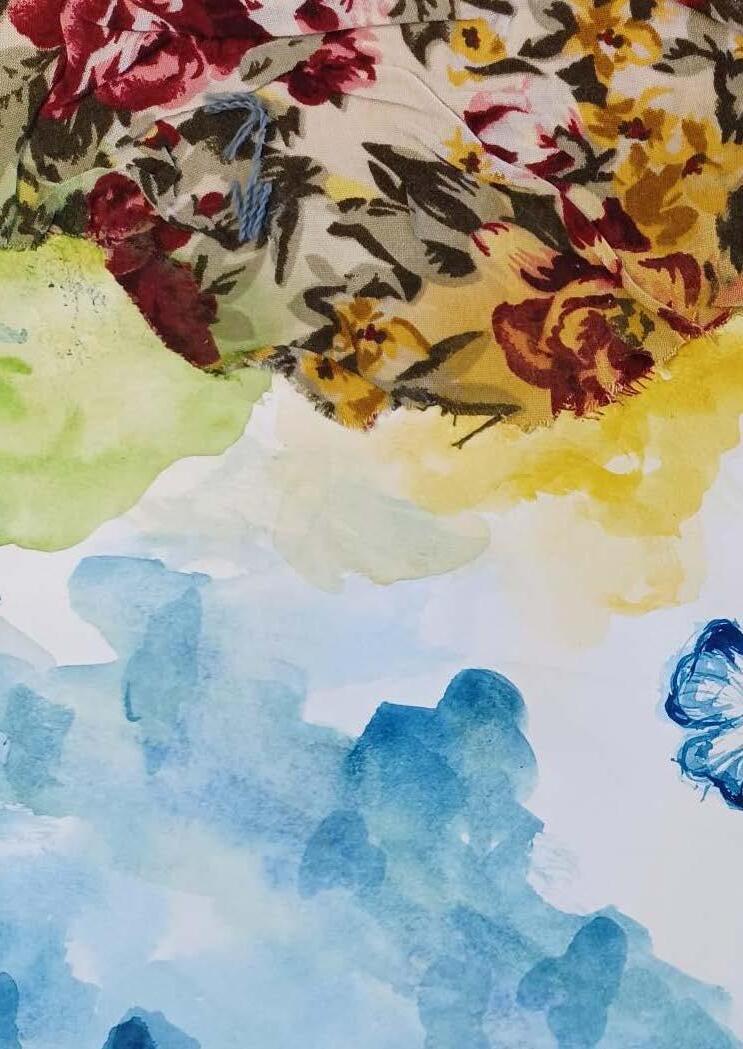LION PRINT 2023
A collection of poetry and prose written and illustrated by Hampton School pupils

 Artwork: ‘1920s’ Matthew Jenkins (Third Year)
Artwork: ‘1920s’ Matthew Jenkins (Third Year)

A collection of poetry and prose written and illustrated by Hampton School pupils

 Artwork: ‘1920s’ Matthew Jenkins (Third Year)
Artwork: ‘1920s’ Matthew Jenkins (Third Year)
Welcome to the eighth edition of Lion Print, Hampton’s Creative Arts magazine that showcases the creative talent and imagination of First Year to Sixth Form Hamptonians.
This year we are pleased to include creative content once again from the Writers’ Room as well as contributions produced in response to lessons across the English curriculum.
The illustrations were provided by GCSE and A level pupils who were responding to the themes ‘Rhythm’ and ‘Cabinet of Curiosities’ at GCSE; at A level, pupils developed their own personal investigation into a theme of their own choice.
This impressive magazine is a collaboration between our English and Art Departments and acts as a fantastic showcase for creativity and self-expression.

We hope that you enjoy Lion Print 2023.
Kevin Knibbs Headmaster
FIRST YEAR
FIRST YEAR POETRY
Pupils studied poetry from the First World War and were inspired to write their own poems.
All is silent now, apart from the sound of flames
crackling in the distance
“Hello…dada Have you seen my da?”
No response
The sun will not come out today, nor tomorrow, or the day after
“Please…please dada…”
No response
Nobody needs the warmth of the sun anymore
It will not soothe the searing pain of the families
“Me and Mama are waiting for you”
No response
Rivers will not flow to this town
Instead, multiple streams of crimson will cover this cursed hellhole like a blanket
Now, as the orange glow of the sun fades away, another sad day comes to an end
Only to be started again the next day
“Dada…I love you…”
By Shiv VermaA shining light, so high up in the sky
Glowing gloriously upon us
As we shelter in the deep dark depths of the trenches
Exposed, vulnerable, almost left to die
Our friendship, the only thing that binds us together
And death, which tears us apart
But nothing, not guns nor bombs nor violence
Will break the human heart
We lie like fallen branches
Gazing up at the sky above
Bruised, drenched, battered
Weary, dismal, shattered
On and on we trek.
By Zidan AkhtarArtwork: ‘Withering Flowers’ Aberam Sukirtharajah (Fifth Year)
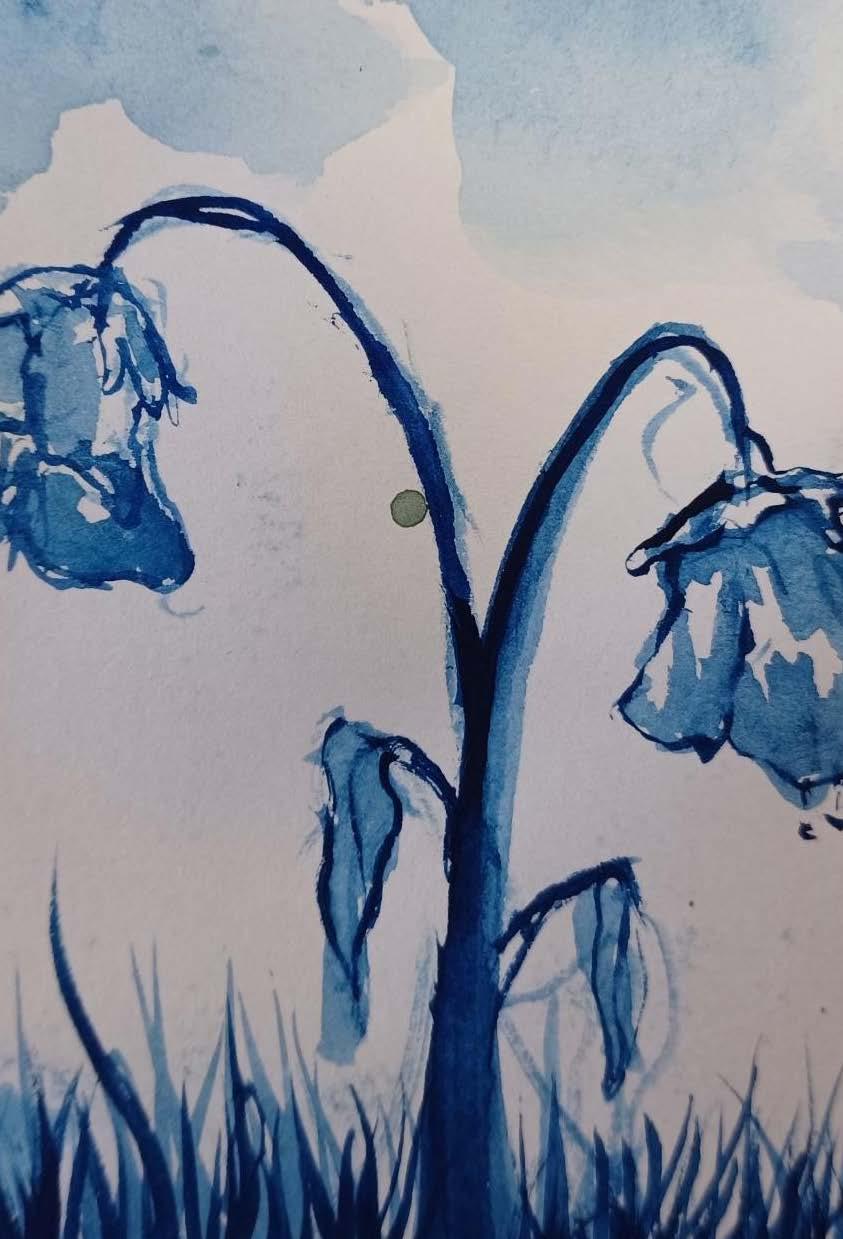

The hellish cries of young soldiers, Young soldiers who leave our world. Despite their pain, despite their loss, No mercy
The rain fell hard on wood and wire, Soaking their solemn souls. The sky rained a ghostly darkness, No mercy
In their simple sleep they look home, Where families grieve and mourn sons. For when the bright beacon calls, No mercy
By Marcus PanditharatnaArtwork: ‘War Stories’
Ralph Crowther (Third Year)
When will you cease? Thick, scarlet nightmare, Scarlet sea, Scarlet sky, Whipping rain, Rugged terrain, Not while this sun shines.

The sound of angry guns’ rapid rattle ringing in my head, Banging! Crashing! Oh, the pain, Rest out of reach, Why must I fight? For King and country, Or so they said. They sent us off in search of glory, Where was it? An illusion, Dark as night, The silence of poison came to greet us, I welcomed him with open arms, My best mistake.
The sun, at last, set in the sky, Curtains drew, People cried, Then endless silence – bliss.
Death is but a blanket, A soft blanket, Saving us from the horrors of life.
By Yusuf AzimovI’m not sure why, but everything changed. I used to be always free, always being kicked about on the luscious grass of the meadow. The two boys would play with me for hours, running after each other in the large, wavy grass. They would sometimes forget me, and have to hunt after me, all while smiling with glee as they bound around in the grass. But now I’ve been packed into this little backpack, squished in between the tent pegs and shovel. I’m not sure where I am going, or if I’ve done something wrong, but I guess I’ll never find out.
I found out we had boarded a ship, a great steel destroyer, but I couldn’t see anything else as we shuffled away, lining up along a muddy dirt path. There was a portly man facing us, his round face plum with exhaustion. He had a small flat cap balancing in his bald spotty head, a jade and hazel shirt covering his huge belly. He was pacing infront of the hundreds of people, an air of forced respect surrounding him. No one moved, no one spoke apart from the monotonous chants every now and again. He seemed to be shouting something, rallying the men. We were soon dismissed, each person moving in line to their shacks. Little did I know, this would be the end of the beginning.
Day in and day out, I sat in the barracks as my owner was outside, running, doing exercise. I found it strange. They were already running. Why not use me for some football? That would have been much more fun. But no. Instead, they were out in all weather, doing what seemed to be a very demanding routine. I took the time to make myself at home in the barracks. They were all in long lines, each one with blurry, mouldy windows near the bunks. You couldn’t see much out of them, just the tarpaulin of the next barrack and some old gnarly trees twisting around each other in a mess of wood. A large, stripped log lined the roof as a beam, and a myriad of spiders clung onto it with their silky webs. Coats hung tiredly on the side of beds, each one saturated with the thunderous rains that plagued the land. The blankets were all laid evenly across the bedding, each one looking like it had been fine pressed with an iron.
It was nearing Christmas, the colourless snow settling on the ground like a freezing blanket. The men came in earlier than usual, each one seeming to tear up a little as they packed their bags. I was roughly shoved into a leather pack, equipment jostling against me as I was thrown to the ground. However, I managed to peek through a hole in the bag. I saw a large cargo truck, a mousy coloured tarpaulin being stretched across it’s top, each side being secured in with a shiny metal clasp. The soldiers all found a seat, their packs on the floor in front of them. Their heads were in their hands, shaking their heads. I could hear their rough voices through the thin layer of leather. I could hear snippets of their conversation, something about war, something about gas, death, smoke. Although I couldn’t see them, I could tell they were terrified, frightened about something beyond their control. Something terrible.
It was night by the time we reached camp. We were in an enormous dugout, reeking mud clinging to the boots of the soldiers. Battle hardened warriors guarded the front of the trench, their bayonets poised over the lip like barbed wire. However, they seemed like shells of a former person, here in body, but not in mind. I hoped that my person wouldn’t end up like that, dishevelled and mindless, shell-shocked and deaf. We were sent far away to a section of our own, and that’s where they sat, head in hands, defeated by the world. This was the place that people become forever changed, forever altered.
We were awakened by a large hooting call, followed up by a large call from a bugle. People were shaken to life, rifles thrusted into hands as they became conscious. I expected to hear the bang of rifles, the smell of gunpowder, but I heard nothing at all. Nothing but the shout of men and the squelching of mud. And then all seemed to quieten down. Soon after, my human came back, picked me up and carried me outside. That is when I saw it. A great white flag, tossing side to side in the crisp, chilly air of December. A person from the other trench was slowly rising out of their defences, both hands raised in peace. He carried no rifle, no weapon of death. My human raised up as well, me held
high in a sign of peace. The other men screamed at him to come down, to hide and wield his rifle. But he did not listen. He cautiously walked forwards, the crunch of snow under his boot the only sound around. He greeted the other, thrusting out his gloved hand to shake the other’s hand. They began to smile, and the other pointed at me.
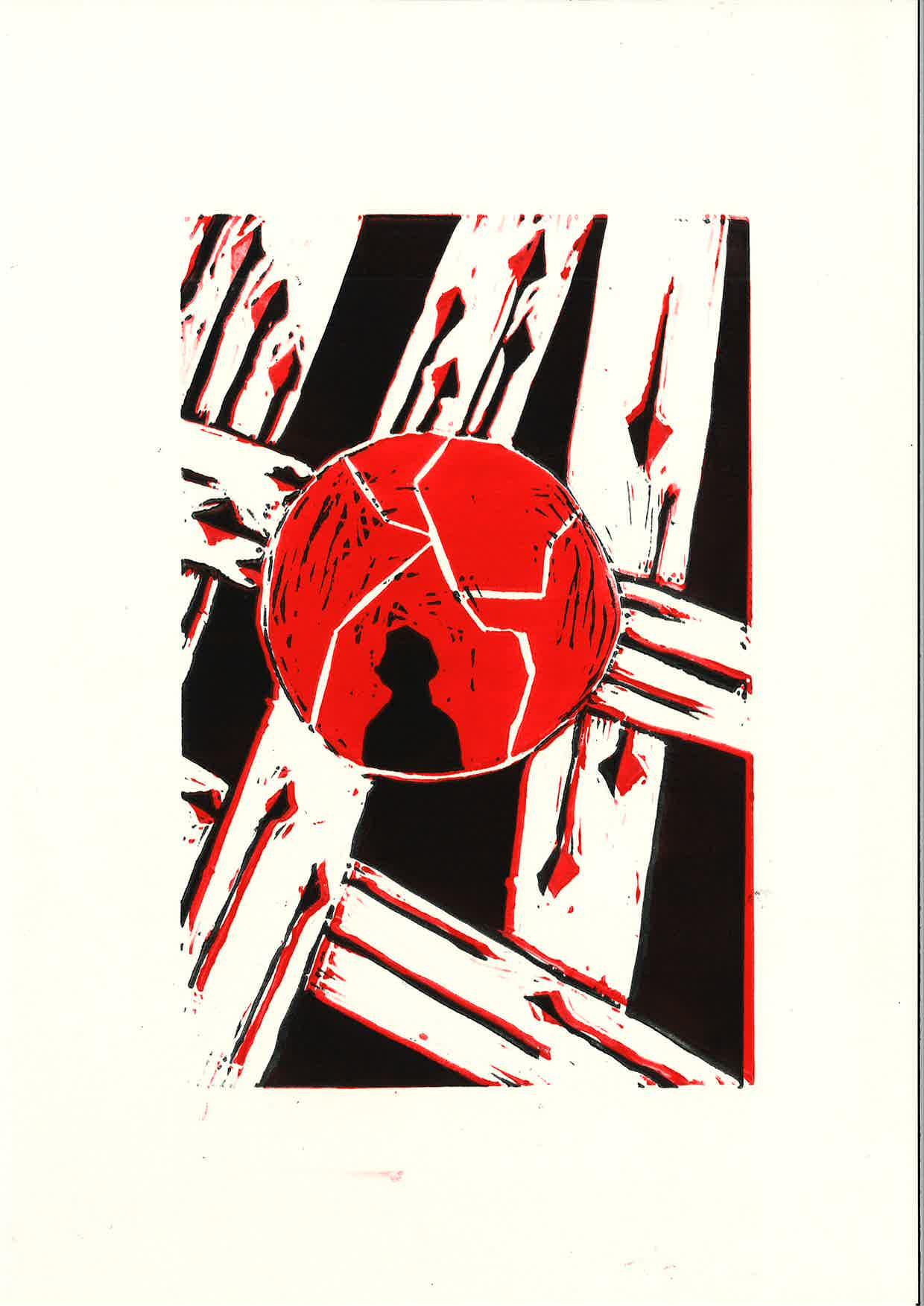
“Fotbal,” he said in broken English, a rough German accent very prevalent in his speech. “Yeah, you play?” My human said, dropping me onto the marble blanket of snow. The man nodded to show he understood and dropped his jacket and hat to make a makeshift goal. My human took a couple steps back, laughing to himself as he made his own goal. Quickly, some other soldiers joined us, laying down their rifles and taking off their coats. They began to kick the ball around, panting as they worked their way through the thick snow. Everyone was smiling as they chased the ball like a cat after wool, and soon everyone was up and playing. It felt great to be rolling around, free of everything that tied us down to reality. No control, cutting through the crispy air like a knife. Nothing could down the mood that had been created by this wonderful game. As if in a proper match, they set up positions, each person playing to the rules. I marvelled at the control of the opposition, how they moved and danced with me under their feet. They quickly scored, tackling each other into the snow as they celebrated. A game plan of our own was soon brought together, and our team moved as one, the crunch of snow thundering in my ears. We brought out an equaliser, whooping as we ran around. This back and forth continued for some time, but no one was disheartened, just happy to play football. However, night soon rose, and the players said goodbye. They shook hands hugged as they trundled back to their trenches, clinging onto the final moments of peace.
That is where my story ends. That final, fateful match that I could play. The seed of hope I thought I’d planted was ripped up soon enough, and the opposition soon destroyed our trenches. Now I am left alone in the skeleton of the trench, never to be seen again.
By Kai WyersHaving read ‘A Man Told Me the Story of His Life’, a micro-story by Grace Paley, pupils were inspired to write their own micro-stories, adopting the perspectives of individuals or even inanimate objects.

Artwork: ‘A Ship in Time’
Eugene Kwon (Third Year)
I am a goldfish. A small goldfish. I spent my entire life in a glass tank, on top of a bookshelf. But why?
My mother said to me: “My dear Pez, you were born in this tank, and you have to stay here. Your purpose is to swim

But I didn’t want to stay. I wanted to explore the ocean. I
So, I said to her: I will find a way out. I will escape. That is
And so, I looked for an escape. I spent hours trying to figure out how I could leave this glass cube that I had been trapped in. But I found nothing. The other fish in my tank thought I was crazy, and I even started to believe them. After all, they were all older, and most likely wiser than me. So, I gave up. I returned to the boring life of aimlessly swimming in circles and eating the same old flakes from
My life stayed that way for two years. Until the tragedy happened: the filter broke. Within three days, many of my friends, including my mother, lost their lives. The tank began to grow green with algae, to the point where the humans outside could not see us gracefully swimming. I knew I could not stay. There was little oxygen left in the water. It was too dangerous. But what could I do? How would I leave? After all, I was just a dumb little fish.
Then a miracle happened. The humans noticed the state of the tank. The humans noticed the algae growing on the walls of our home. The humans noticed that we were in danger. And so, they picked up the bowl, took a few steps,
This meant I had done it. I was free! I had escaped the tank, even after being told I was crazy. I could now rest,
Artwork: ‘Robot’
Jatin Chandra (Second Year)
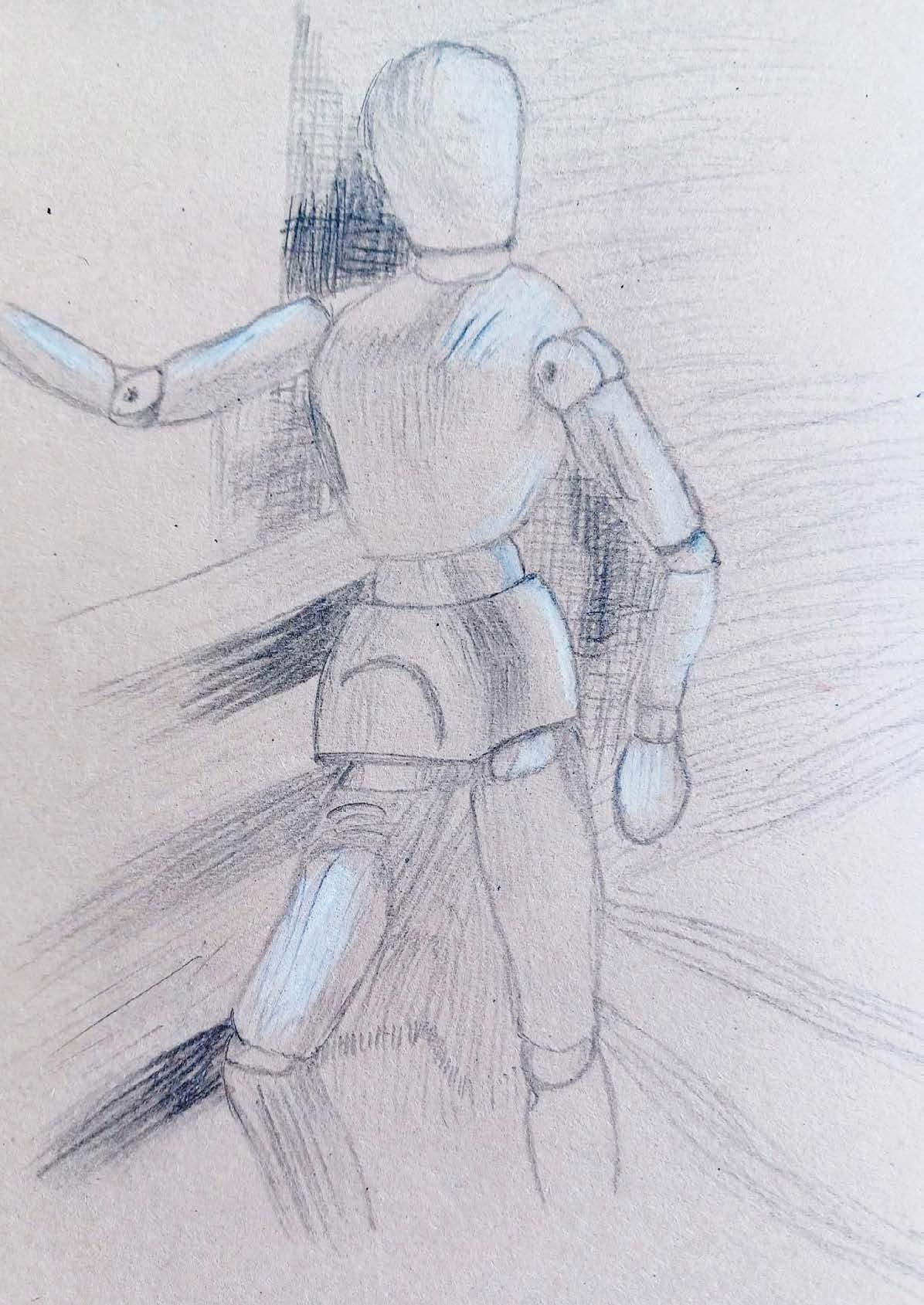
A robot-pancake maker said: I didn’t know what I wanted to do with my life. I remember a man pressed the power button on me and I woke up. Then he started tapping something on me. After he finished, I learned about all the different types of pancakes and how to make them: pancakes with Nutella, pancakes with sugar, pancakes without sugar, vegan pancakes, non-vegan pancakes. Then he tapped on me where it says, “Pancakes with Nutella”, put money in me and I started to move to the kitchen automatically. I made five pancakes with Nutella and brought them to him, but I didn’t even realise how I had done it.
After that they packed me in a big box, and we started to move somewhere. I didn’t know where we were going and what I was going to do there.
And now you can see me. I am somewhere in Japan making pancakes for people who visit our building, mainly tourists and families with their annoying children who are interested in robots. Every day my “owner” collects money from me and goes home, leaving me with the other robots. To be honest I do not like making pancakes. I want to be a robot who can talk to other people and other robots. Who can be a good friend or join a good family. When people come to me with their families, I feel so happy and when they leave, I feel so upset. They are the one thing which makes me a happy robot…
By Illia ZhyzhnevskyiThe suitcase said: I was waiting, waiting eagerly to be owned and loved. Life in the storeroom of a shop was hard for me. It was always dark, always gloomy, and I was alone dying in a plastic cover. When that door between me and the shop was opened, I felt hope. Hope that I was going to be bought by someone who needed me. Instead, I could hear the other suitcases talking about me. About my birthmark.
They said, “Look at it. It will never be taken around the world, unlike us. Because we’re perfect and it was born with that horrible, ugly defect.”
And then the door shut, again.
I said: My friend, you know of my birthmark, don’t you? My padlock doesn’t work and so no one would have ever wanted me.
One day, that door opened again. This time, I couldn’t see the others. I thought the season was over. I thought that I would die. But then I saw her. Was this my new owner? I was then wheeled out for the first time.
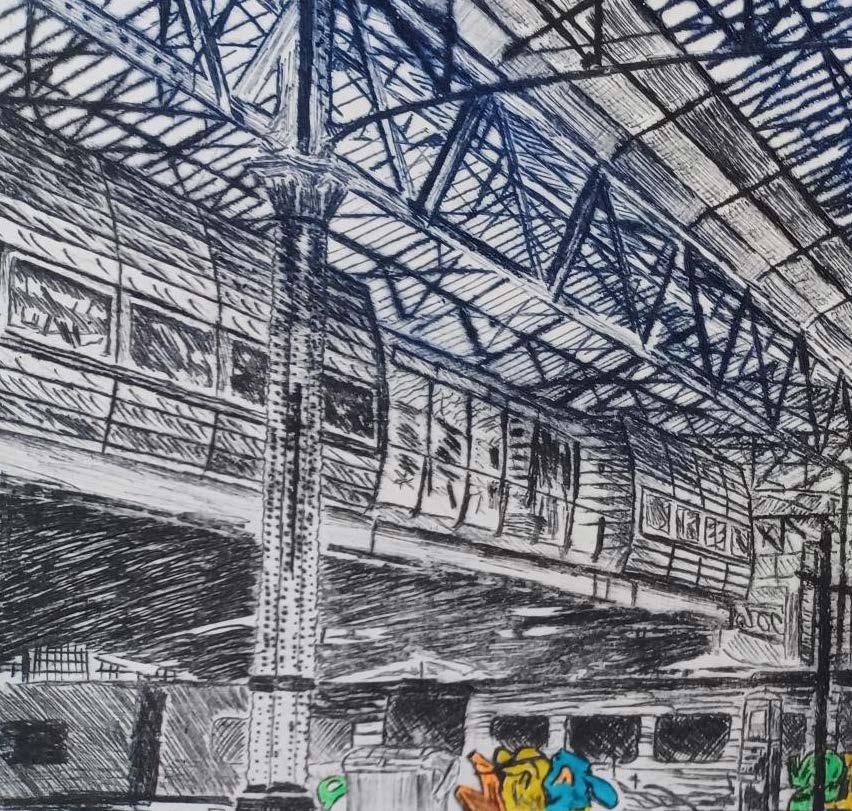
The store manager said: “The built-in combination code for this suitcase does not work. 20% off.”
She said: “I’ll take it.”
Love, at last. And so, she took me around the world, and I’ve ended up here: on this flight to Seattle.
I can’t believe that I’m still here. I am so battered and tired. I am approaching my death. My zippers don’t work now, and my owner has to tie me up with a safety pin. My corners are scuffed, and I have bruises everywhere. I hate baggage handlers. They just do not treat us with the respect that we deserve. The belongings that I keep safe for my owner would have been stolen by those handlers if she hadn’t bought me a new bright pink padlock. I think it looks perfect against my black outer shell.
My owner used to look after me. Those were the good old days. She used to wheel me around gently, and even picked me up so I didn’t have to get wet in a puddle. But now, she doesn’t care about me as much anymore. She knows I’m old – 20 is a good age for a suitcase. She didn’t even clean me up now and now there’s so much dropped coffee and tea on me.
Artwork: ‘Train Travel’
Calum Warmer (Upper Sixth)
Still, I remain faithful to her. Any other owner would have thrown me out, but she didn’t. I think that she still loves me, deep down in her heart.
The landing into Seattle was very smooth. The baggage handlers arrived, and I was waiting, waiting eagerly to be reunited with her. Suitcase after suitcase was placed onto the carousel.
Then, the plane doors shut on me, the last suitcase, and I would never see her again.
By Joshua Ripon
Artwork: ‘A Bee’ Michael Ronga (Fifth Year)

A beehive said: I do not know how I came to exist. I have always been here, nestled between these two branches like a child in the crook of its mother’s arm. I do not even exist at all, and my thoughts are merely non-existent ripples across a cosmic sea. Either way, there is only one thing I can be sure of - my family.
Without the comforting whine of rapidly beating wings drumming a steady rhythm against our brittle walls, or the sense of oneness that comes of knowing that our relationship is completely symbiotic, I think that I would simply cease to exist.
Of course, I do not think that my inhabitants are even aware of our connection. That does not matter to me. So long as we are alive, I have a purpose.
I feel as though I know every member of my family personally. For beings such as you, beings with complex emotions, cultures, and language I have no doubt that that is always the case. But in our simple community, I do not even know if any of my family, except for the queen of course, knows that we exist.
The queen is different. For a start, she seems to me to be about four times the size of the others. Beyond that, though, beyond what you humans could ever comprehend, she knows who she is. We are connected, even more so than the others. I think if I had a heart, its strings would be attached to hers.
For however long we have coexisted, our intertwined lives have been tranquil. Peace is all we have ever known. Yes, more of our number are claimed by the culling blade of winter each year, but I do not think death means the same to us as it does to you. From what I can gather from the random snatches of conversation I catch every once in a while, it seems as though you pass right through, never to be seen again. For us, it is different, although I cannot claim to know how.
But now I can feel something changing. I do not know if they are growing apart from me, or the other way around. I know I am getting older - my walls are thinner and weaker than they ever have been before. I feel as though more of them are dying, the queen is laying fewer eggs every year that passes. What if-
Suddenly, the thin stalk, connecting the hive to the ancient oak it lay on, snapped. With no lifeline to hold it in place, it tumbled down from its cradle and shattered on a bough. As it was pulverised, I managed to catch one final word from it - ‘Queen.’
By Ali TaitA clock said: I was put up high one day. Two or more metres from the ground. I never knew who they were. I never knew what they were saying. I never knew why they glanced up at me so occasionally but so often. It was either silent or loud in that class never in between. I grew to know someone more and more day by day however. She would show up promptly every morning without fail, and conduct the others, so effortlessly yet sternly – I could only admire her. I greeted her every day, every morning, every lesson, every lunch, every break. Until one day, she didn’t show up.
A young unfamiliar man sat in her seat, at her desk, using her computer, her pens, her chair. I could tell he was timid, he looked threatened by the others. His stature and his ways were hardly as powerful as my previous companion. He was never on time always late, I longed for her to walk back in that room. Instruct like she did, talk like she did, conduct the others like she did. I always made sure to be there for her- a reliable glance above her shoulder when she needed it.
I thought that’s how it would be, just me and her in that classroom, the two most reliable people in there, yet it wasn’t. This new addition to my class, only made the others look up at me more. Counting down the minutes until the end of the day I figured. Suddenly I was more wanted yet less needed.
By Gianluca Cohen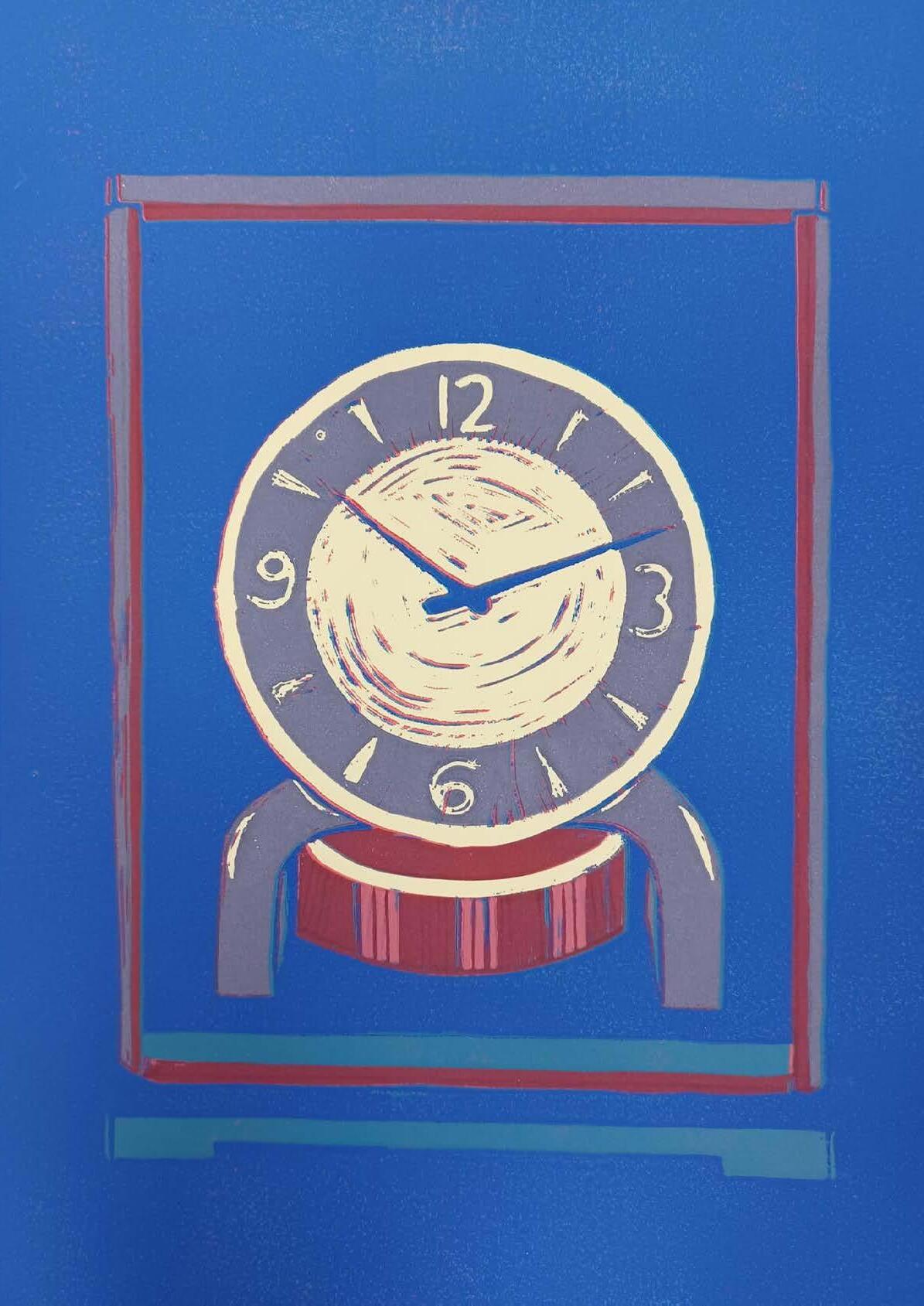
Artwork: ‘Veteran’
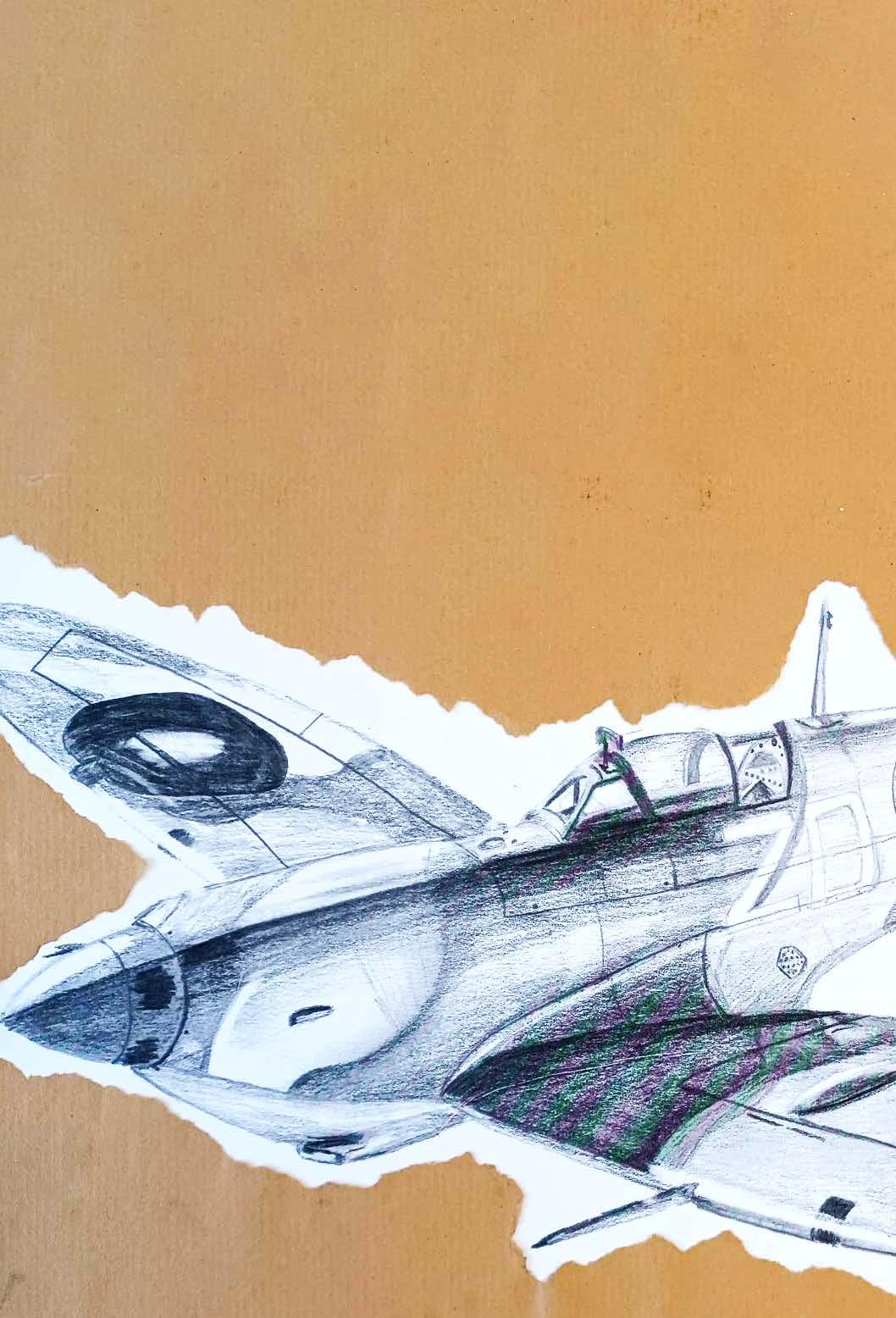
Sergeant said: we’re going to Vietnam.
I didn’t want to join the army. All my family didn’t want me to join the army. But why? Little did I know, in the army there was more suffering and death than I could ever imagine. I could shoot a rifle. I could drive a tank. I could kill. But I didn’t want to.

Then we declared war on Vietnam and my life was turned upside down. I didn’t fight to kill. I fought for the freedom of those who couldn’t. In December 1955, I headed to the conscription office and signed up as a medic.
I made good friends with my comrades, all of which fought for America and freedom. We went into the jungle every day. We found traps, they killed the enemy. But one day, we went out into the trees and only our Sergeant returned. Most of us were killed, and I was captured.
I was made to work, day and night working. Making weapons, digging pits, cooking for soldiers. I was a slave for the enemy for years, unable to do anything I wanted.
Then I heard the bombs, fire encircled my prisoner camp. The Vietnamese said that we were all done for. Then the bullets flew. I saw people from my army, they stormed the camp. I was saved.
Now I am back in America with my family, but I don’t feel free. If a door slams, I remember the bombs, if I see a firework, I think of the napalm. Everything reminds me of death.
They said I was overreacting, but the war haunts me still. The army wants me back, the numbers of injured are increasing, but the soldiers are getting nowhere. I eventually returned, became a soldier, and I was lethal, I led a regiment, we took ground quickly.
They said to me: How do you know how to lead an army?
By Milo WalkerA woman on the bus said: “I wanted to become a physicist. I adored the idea. I spent hours on end studying and learning each equation.”
My mother told me, “Carol, get rest. You will need it when you become a mother.”
I replied: “I want to be a physicist, I understand the maths, I understand how it works”.
My mother said, “Fine, but don’t come running to me when it goes downhill”.
I went to university, I found an interest in engineering. I learnt every tool, every material, its uses and properties. If you look at me today, you can see. I have a good job and I am married. My wife Pauline and I both have good jobs and do not want to have children. We both work in scientific fields, me in nuclear physics and Pauline in astrophysics.
Did you know, I stopped an explosion?
Early into my career, we had a rogue nuclear bomb which had not been properly maintained. I spotted this and confirmed with my supervisor that something was wrong with the weapon.
“Sir” I said, “This bomb has not been properly maintained, it could explode”.
He replied, “We need to be certain before destroying a nuclear weapon of this magnitude. It is a very dangerous and expensive process”.
He returned, not five minutes later and said to me, “Carol, how did you know?”
By Robbie McQuater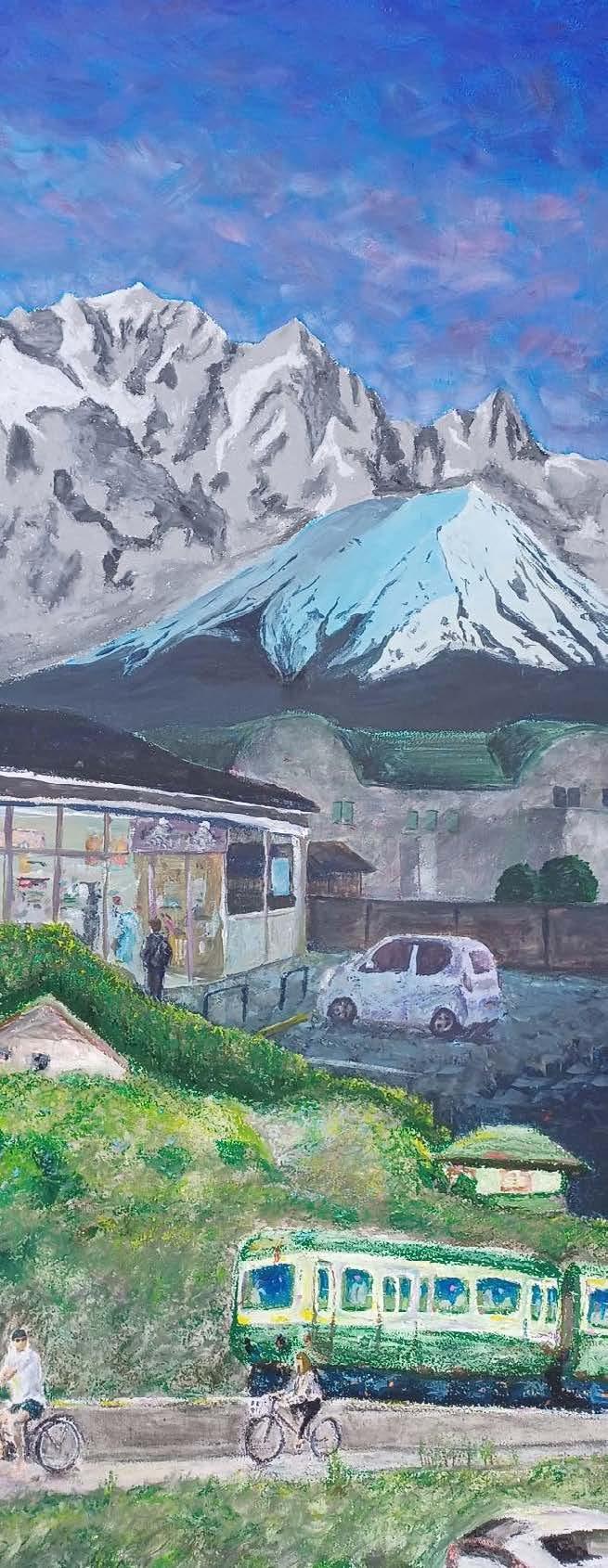
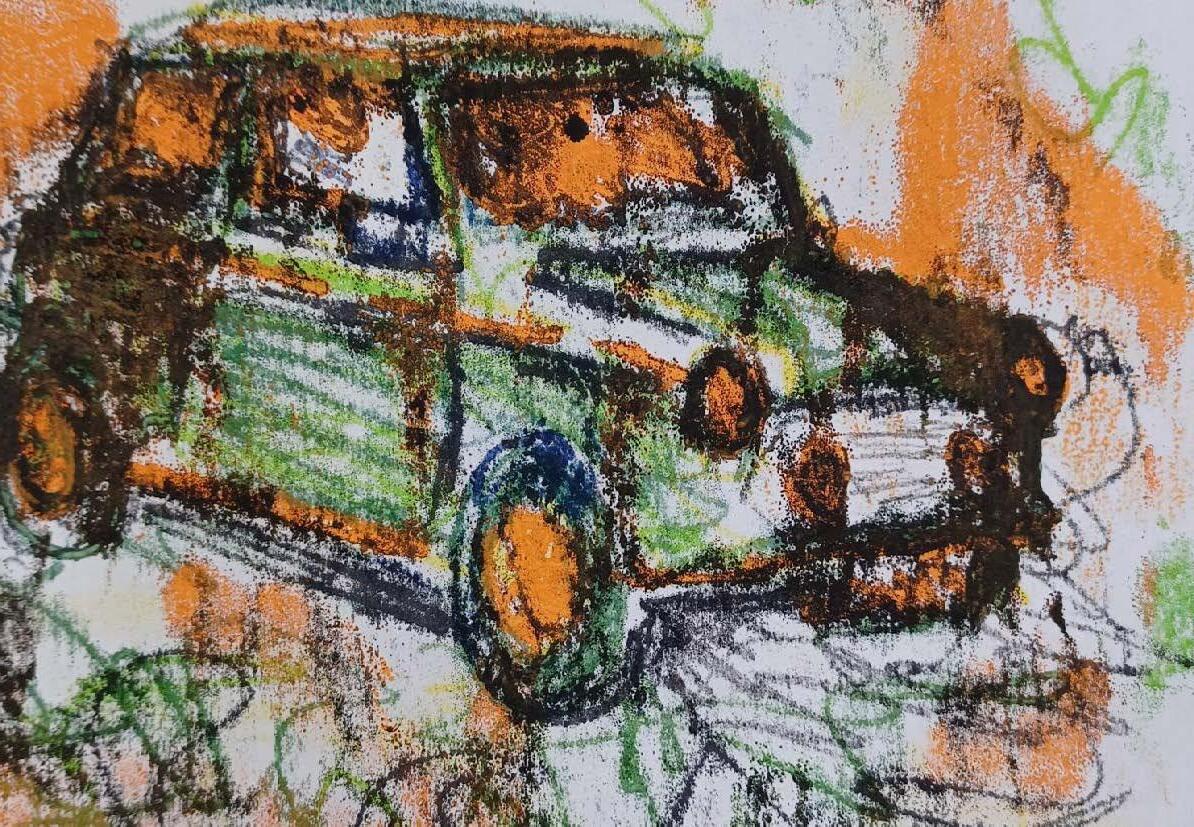
A Mini Cooper said: My tyres squealed. My newly crafted chassis creaked. And my glimmering red paint blinded those around me. With oily hands, and greasy jumpsuit rolled down to his waist, my creator rolled me out of the garage and into the world. I gloried in the sun light, beaming down on my Go Faster Stripes. It felt like I was the Car-King of the world. Ford Galaxy’s would bow down before me, not even a Mercedes A-Class could overtake me.
But then, Darkness! I was forced upwards and driven away from my beloved creators. And then I was born again. My tyres rolled. My recently crafted chassis rumbled. And my glimmering red paint glowed. Where was I? What had happened? Why was there a thing touching my bonnet? He looked like my creator, but without the oily hands, without the blue jump suit rolled down to his waist, and without the loving look in his eye.
After a few weeks of driving the same roads with this new owner (I knew that’s what he was after a few days), it dawned on me that this would be my life, maybe forever. Boring, repetitive and tiring, I would drive my owner to and from his work for 7 years. I would park next to NK15 NAA, a grey
Ford Mondeo, and PL57 UDE, a silver Nissan Note, every day, being forced to listen to their constant mumbling to each other about which of their headlights were brighter, or whether or not silver was a shade of grey, and whose rims where shinier. It made me want to rip my wind screen wipers off. But one spring day in 2020, my owner stopped driving me, and moss started to grow over my immaculately washed rims, and my windscreen became foggy. I couldn’t understand what was going on, this had never happened before. I began to miss my grey car friends (having listened to their constant bickering, I had decided that silver was a shade of grey). I missed my daily drive to and from my owners home to his the destination which he put in my sat-nav every day. Then a lot happened at once, A bright yellow van with flashing blue lights turned up one day and something was wheeled into the back. Then, a new family came to the house, eventually moving in and I was covered with a sheet once again. Eventually I was towed here, the scariest place I’ve ever been, simply waiting for my turn. Every other car I’ve seen here has been dragged into a huge box, and then lifted out the top as a cube of metal. My tires dragged. My rusting chassis crumbled. My faded red paint was dull in the sunlight as I waited for the end.
By Teddy HartPsst! Hey, you! Over here!” said the voice. I looked around, but there was no one in the room. Then, I noticed a pencil lying on my desk. It was talking!
“Did you just...?” I stuttered.
“Yes, I did. And I have a story to tell you,” said the pencil. I leaned in, curious to hear what it had to say.
“I’ve been around for a long time, you know. Longer than you can imagine. I’ve been used to writing love letters, grocery lists, and even novels. But there’s one story that stands out the most,” said the pencil.
I urged the pencil to tell me more.
“It was a dark and stormy night, and I was in the hands of a young girl who was sitting at her desk. She was crying and writing furiously. I didn’t know what she was writing, but it seemed important. When she finished, she placed me on the desk and left the room. The next morning, she was gone, and I never saw her again.”
The pencil fell silent, lost in thought.
“Wow, that’s quite a story,” I said.
“I have many more,” said the pencil. “But it’s up to you to tell them. Use me to write your stories, and who knows what adventures we’ll have together.”
With that, the pencil fell silent, and I was left alone in my study, my mind buzzing with ideas. I picked up the pencil and began to write, wondering what other stories it had to tell.
By Yuvraj SahotaArtwork: ‘Pencil’ & ‘Pen’
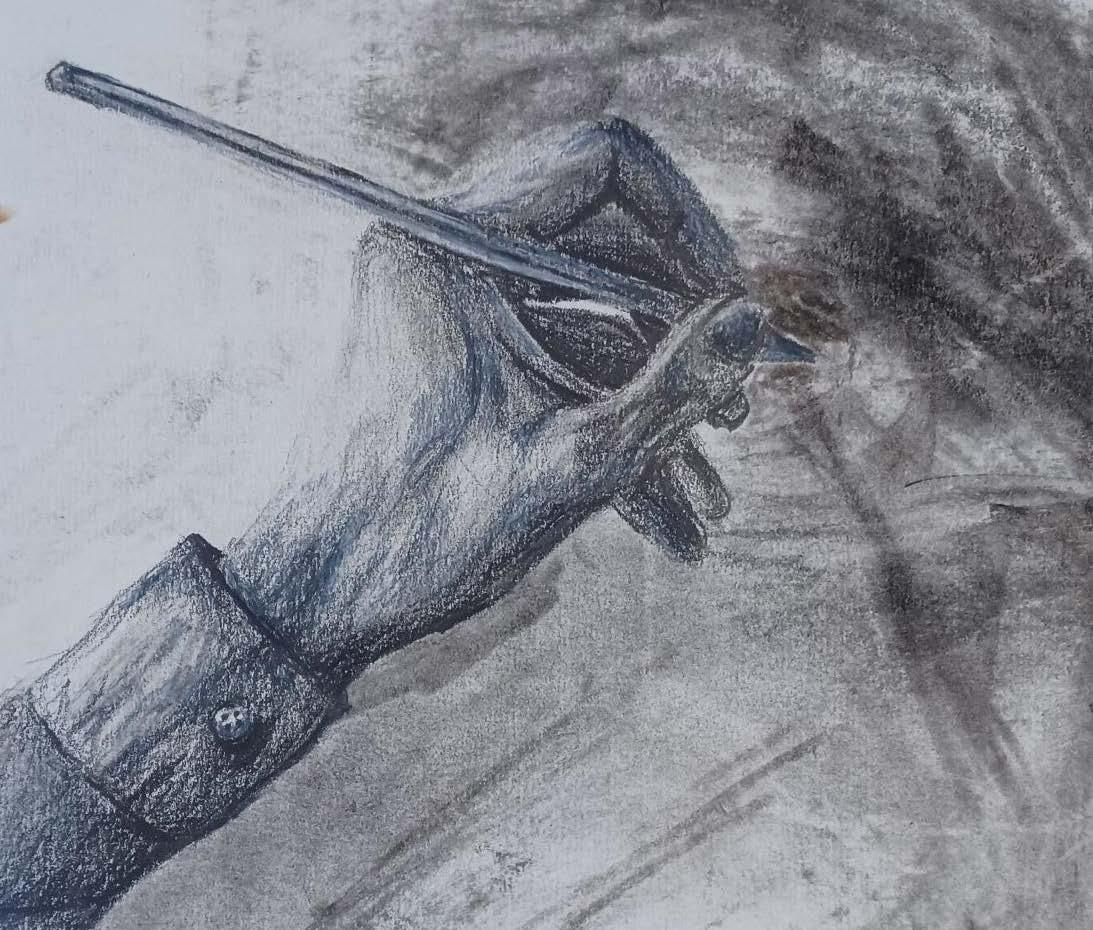
Michael Ronga (Fifth Year)

Artwork: ‘A Gothic Story’
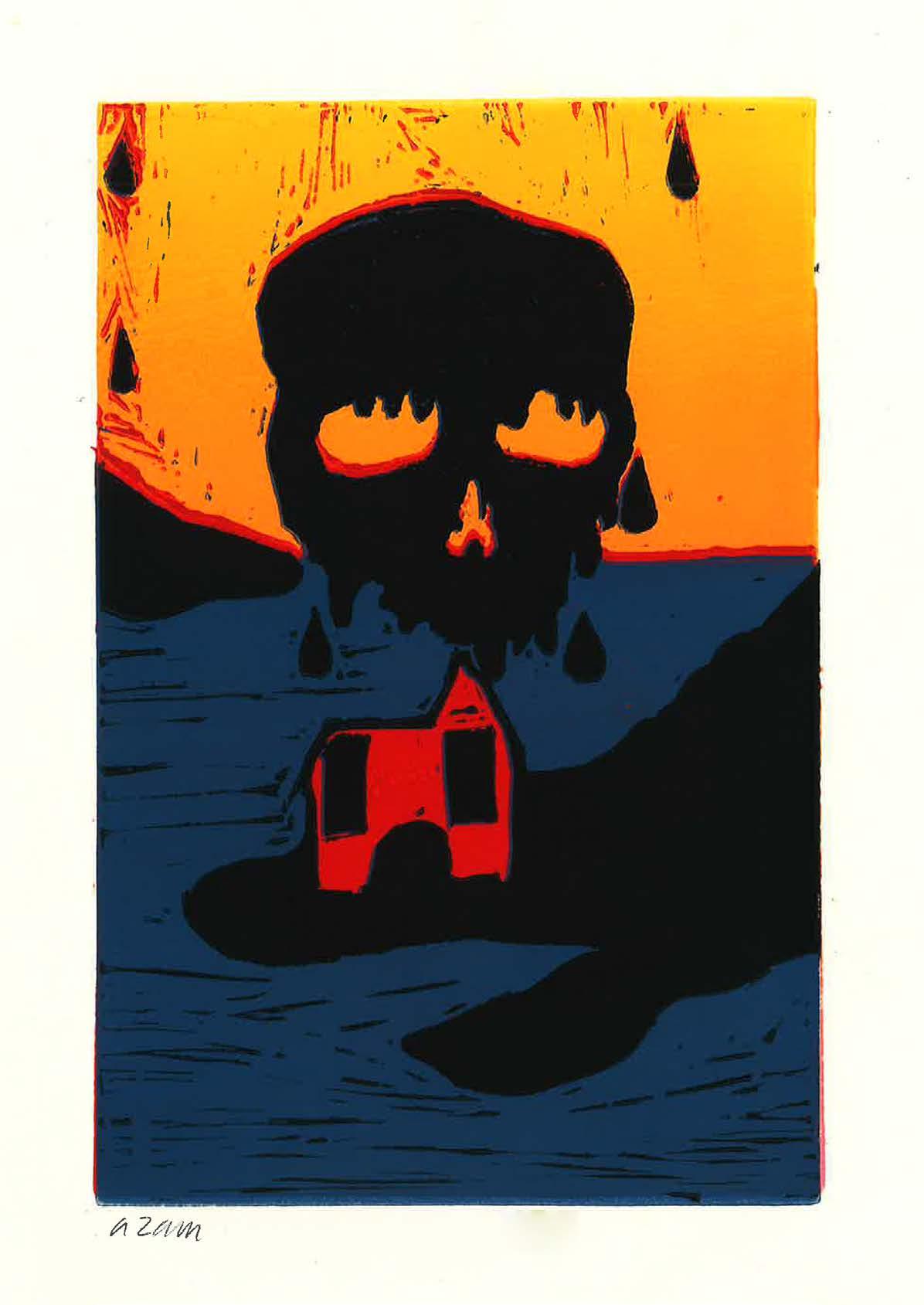
Azam Ahmad (Third Year)
THIRD YEAR WRITING BASED ON IMPRESSIONIST PAINTINGS
A siren’s scream shrilly sounded. The dying air of the dark metropolis was randomly penetrated by distant clattering on the flagstones paving the lonely streets.
The only faint glimmer of light emanated from the long, curved window of a periwinkle-walled diner. Isolated, slender beams of cold luminescence were discarded, scattered against the dark olive frames of gloomy doorways, from whence there issued not even a slight sign of life.
Above the scene, set back rather from the dim serenity of the street below, angular patterns of inky black were thrown up against the peeling ceilings behind those narrow, rectangular frames set amid the lifeless silhouettes along the street.
Timber frames, deep shades of chartreuse, glistened against the weakening light of the flickering lamp-post. Raindrops danced along the windowpane, vaguely obscuring faded gold lettering which read ‘Nighthawks’. Wishing its drab walls, the air of the diner was thick with silence, save for the occasional clink of glass against porcelain.
Three figures hung, their frames draped dejectedly over the triangular counter, an island of solace in a dying metropolis, a vague sentinel among the silent streets. At the centre of the scene sat a solitary man. A flaking butt of a cigarette dangling loosely between his pallid fingers, his angular face, etched with concern, was accentuated by the sharp edges of the fedora from which it was protruding. The drained glass of whiskey denoted a constant struggle. To his left, a woman was perched on a stool, her vibrant
rose dress offering a bold contrast to the muted palette of the diner’s interior. Her legs crossed elegantly, she gazed dreamily beyond the grubby glass, a cold expression alighting upon her face. She grasped a stout serving of liquor in her left hand; the other she used to support her drowsy head.
Opposite them sat another man, his weary expression bemoaning a desperate lack of joy. Clad in a rumpled suit, he stared into his coffee cup, his hands trembling slightly as he raised it to his pursed lips. His ruffle, slightly bedraggled, presentation spoke of a burden upon his weary shoulders, a lingering pang of regret expressed in his silence.
Lastly, a bartender stood in the background, a silent observer to the nocturnal dramas unfolding before him. The white apron hanging over his slender finger accentuated his professional demeanour, yet his eyes held a touch of melancholic sympathy for those who sought refuge within the walls of his establishment. He moved with a calm and collected purpose, pouring drinks and wiping down the bare counter.
Together, these characters’ struggles, frozen in time by the strokes of an artist’s brush, haunted the memory of all who passed that dreary November night, beneath the pattering drops from the leaden sky.
By James Brocklebank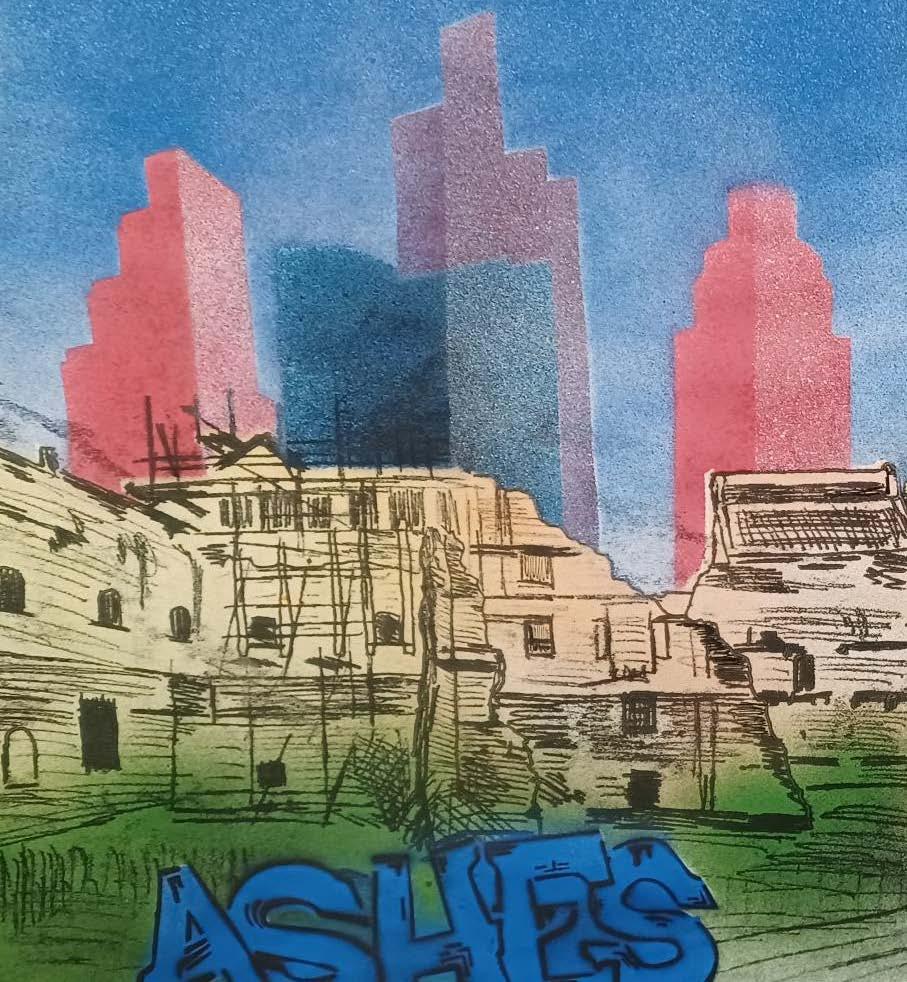
A thick blanket of pale grey cloud had settled over the city. The clouds were low in the sky, and appeared not to move, as though weary from a long day of travelling. Dark patches sat in the sky, brooding, and ominous, seeming to float more heavily than the other clouds. The aroma of damp air blew through the city, an invisible, all-pervading mist. Light from the shops and the perpetual motion of the shoppers made the street come alive. From above, it was a beehive in spring, miniature black-suited creatures, buzzing from place to place, the atmosphere full of purpose. Flanking this busy bustling beehive on either side stood towering, grand buildings, like a line of guards on duty motionless and poised. None of the light from below seem to reach them; the guards stayed alert, ignoring distractions around them.
Down at the feet of the buildings, rainwater had drenched the road and it scattered the lights of shops and cars all around the city square, as though a sheet of tinfoil had been stretched along the tarmac. Sailing slowly through the air, ruddy orange leaves caught the reflected beams of golden light, spreading the colours of autumn everywhere. On the ground piles of these leaves, rustled and crunched, as they were crushed by the ever-audible slap of leather shoes pummelling the ground, or brushed away by a blast of wind from the passing of a car. As dusk began to fall in the distance, the buildings further away seem to lose their vibrance and colour, as if the setting sun gradually sucked the liveliness and animation from the city.
Artwork: ‘The City’ Isaac

While the light disappeared from buildings, the once-thriving mass of shoppers seemed to dissipate, cascading out of shops and ebbing away into alleys and train stations, a throbbing tide of charcoal suits and snowy dresses and shirts. People all around slipped away from the square, until all that was left was the vehicles carrying the last of the shoppers home. A sleek, charcoal cab glided down the road like a gull carried by the wind. In the rainwater, the taxi’s headlamps cast a glimmering ripple of amber light; they were a cat’s eyes, cutting through the darkness. Close behind came the clip-clop of two majestic stallions with glossy, white coats that seemed almost painted onto them. Attached to their reins, an ornate carriage of deep ebony, furnished in crimson and
gold and surrounded by the sharp aroma of wood varnish advanced up the street. Eventually, even the clipping of horseshoes on the road died away, and, as the sun set, the night was silent at last.
By Johnny RoféThe black cab sped past the horse drawn carriage, years of engineering and development separated by a few metres. Protesting horses shied away from the fumes of the vehicle, but with a shout from the driver and a crack of a whip they were back on track. Passers by were furious as they were doused with the spray kicked up in the cab’s wake, but the cab had already disappeared along the rain slicken road by the time their irritated curses were thrown at it.
The cab continued to make its way through the streets. The encroaching evening, combined with the threat of rain hanging in the air, had sent many scurrying into the surrounding buildings and those who battled on were wrapped in extra layers. Heads bowed against the light breeze and chatting animatedly they struggled on, even the coldness couldn’t dampen the serenity of the picturesque day. The sky reflected the feeling, a pale blue sheet draped over the bustling streets, looking after the shoppers far below. Wispy clouds acknowledged the changing of seasons as the days grew shorter and the temperatures plummeted. As the cab moved along the street, the smudge of night was already straining the far reaches of the horizon and the warm light of the buildings spilled out into the gloom in invitation.
Breaks grinding harshly, the cab skidded to an abrupt halt at the blinking traffic lights. A leaf fluttered down onto the cab, the stooped trees shedding their burden. They shivered in the building wind, naked branches void of any protection against the dropping temperature as the sun crept below the horizon. Pedestrians bustled towards the door of the café on the corner as the gale picked up, desperate for refuge. The café was already almost full. Figures peeled off layers of wet clothing whilst others crouched over the table cradling hot drinks with fingers numb from the cold. The remainder, who were turned away by the employee shouting orders from the door, covered their heads with one arm and, with their shopping bags tucked under the searched desperately for somewhere to get inside.
The lights flipped green, standing out as the night descended, and with a squeal of rubber the vehicle was on the move again. Looming, historic buildings passed in a blur as the cab hurtled out of the busy shopping district, the beckoning lights disappearing into the gloom. Elegant, marble structures slightly weathered by age framed the long street. The cab turned the corner and disappeared into the Parisian night.
By Oliver BoothArtwork: ‘The Cab’
Isaac Quigley (Upper Sixth)
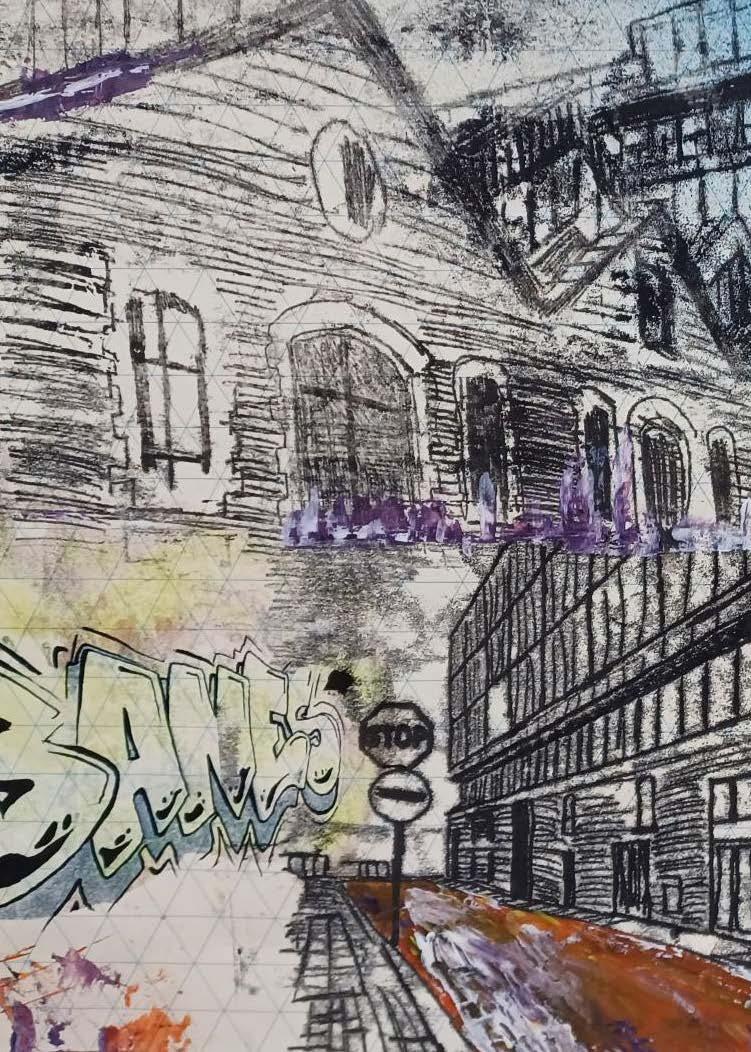
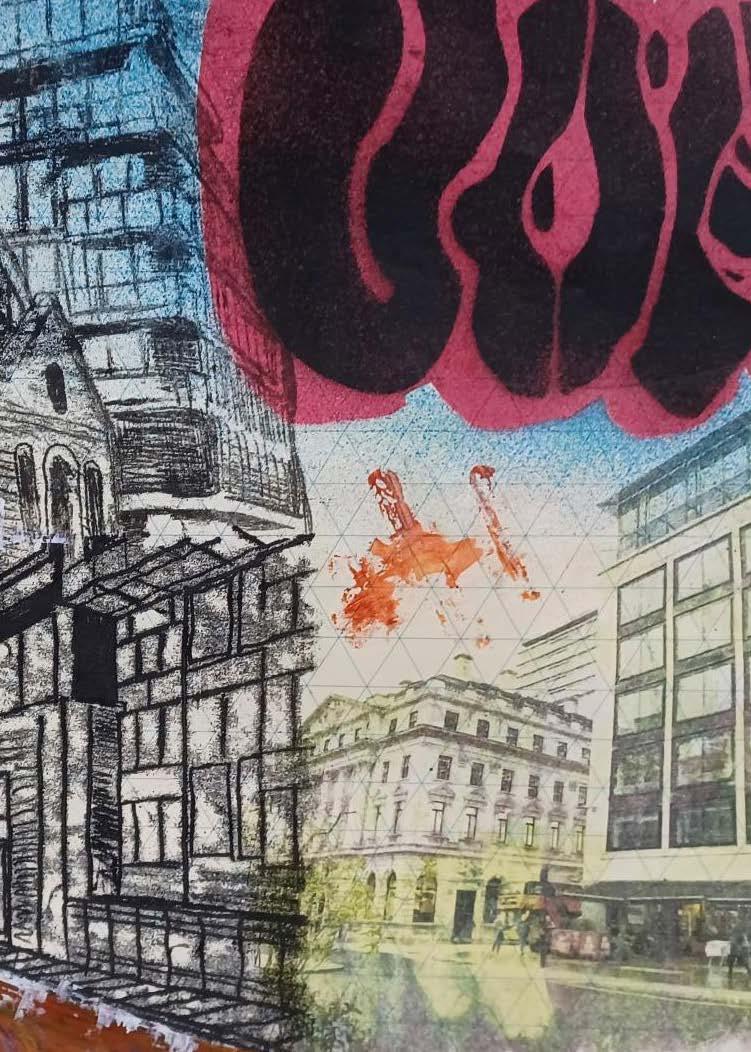
Artwork: ‘Gothic Story’
It was a cold and dark Winter morning. The impenetrable clouds hung in the sky like bodies from the gallows, allowing not a shard of warmth through their grey, desolate blockade. The bird song that once happily echoed throughout the village had been replaced long ago by the sound of thundering rain and it was another morning in which the Hunter wished he hadn’t woken up.
The flame of the lone candle by his bedside had waned since the evening and now was replaced by blackness and quiet, soon disturbed though by the dull, ominous thud that arose every time the Hunter took a step towards his fireplace. Grabbing his flint and steel, he rubbed them together slowly but firmly, emitting a sound as though a beast was scratching at his very own door, until a spark; and then flame. The Hunter watched at it intently, before grasping his stoker and prodding at the coals loosely, as if he was only doing it as a distraction, his conscious mind wondering on other matters.
He walked purposefully to the other side of his room, where a bowl of cold porridge sat unattended and, picking up a spoon, he took a mouthful. If it was an unpleasant bite, he didn’t show it. Whether he simply couldn’t be bothered or would not give the absent spectators the satisfaction, not even he knew. Rising to his feet, the Hunter slung his dark ashen-wood crossbow over his shoulder, and brandishing his black, leather cap tightly, he opened his door.
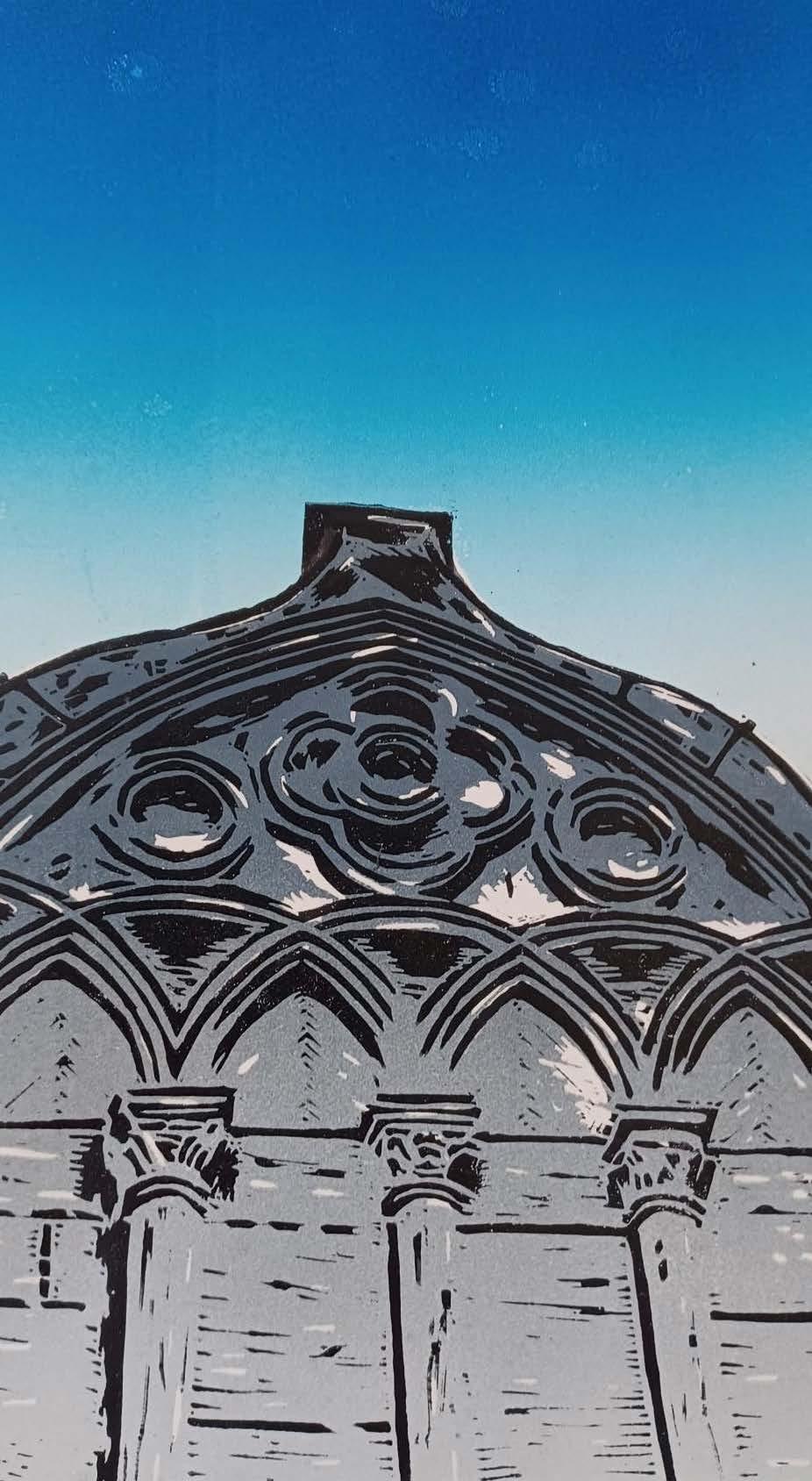
The dark grey clouds that occupied the sky had now blackened and the persistent rain had evolved to a torrent of shooting wet and cold; these now accompanied by a howling wind, shrieking throughout the town, as though it was an injured beast. The black coat of the Hunter flapped violently, like a deformed raven attempting flight but the Hunter, unaffected persisted without emotion.
The forest stood ominously behind the cobbled bridge, it’s trees soldiers in an army of black wood and leaf. It was known as the ever-changing forest; no tree trunk, badger
hole, mark ever there twice in a row… But this was not the Hunter’s concern… So, he continued. The dark trunks of the battalion that now surrounded him provided a sense of comfort. Cover for himself and his prey. In that way the Hunter thought it fair.
Prowling through the forest, a demon, the Hunter stalked steadily from tree to tree. A brown beetle sat comfortably on the nearest branch. Its shell shone brightly despite the dark surroundings until snap. A spider leaped onto it and digging its fangs into the head and adding it to a fine collection of prey in its web. This was the way in which the forest functioned. Then out of the black the Hunter spotted something. A pale white stag. Its coat was snow white, not a single imperfection of any kind, a blank canvas against a wall of dark misshapen colour. Its eyes were sapphires, glowing a bright but navy blue, as if they were pools of the night occupied by millions of ancient stars. It pranced gracefully from trunk to trunk, each time it went behind one the Hunter fearing it would disappear until it stopped. The Hunter cautiously reached behind his back, grasping his crossbow tightly. Slowly he reached for a bolt from his jacket and after what felt like an age, he procured one. Its head sharpened and ready, while its base stood firmly, completely straight. It was clearly an instrument of death. The Hunter calmly placed the bolt into the crossbow, clocking it back cautiously and then he took the shot.
He composedly walked over to the injured animal. The shot had landed right in the side of its neck and now it lay helpless on the ground. Its pristine coat invaded by patches of scarlet red. The animal was noiseless. All that could be heard was the light breathing of the two beings and rustling sounds of the forest. The Hunter reached inside his jacket for the second time and now brandished a jagged hunting knife. Then showing no signs of emotion or sympathy he slit its throat and the stars in its eyes faded.
The Hunter slung the stag over his shoulders and now much the same as before he walked. Walked back through the forest. Through the wet, through the cold and through the wind until he reached the cobbled bridge and looked up… There before him stood a figure.
Its features were indistinguishable. The Hunter couldn’t tell where its limbs began, and torso ended. A hole of blackness, it was devoid of everything: and it was
standing over the edge of the bridge. Suddenly it shot its hand out towards the Hunter and then blackness… followed by a ghostly scream like nothing he had ever heard before erupting from the centre of the bridge, and then a splash.
The Hunter ran to the edge of the bridge, where the figure standing just moments before. He looked over but nothing: not even a ripple. There was no sign that anything had happened there in the last hundred years. The Hunter was shaken. His face now pale as the white stag that still sat on his shoulders. The only thing that could be read on his face was fear. So, he ran. He didn’t care about the deer anymore; all that he thought of was the safety of his house, where nothing could harm him. Safety. So, flinging the deer off of his shoulders he sprinted through the cold, through the wet and through the wind until he reached his door and entered.
The embers of the previously great fire that the Hunter had started still shone but all he could think about was sleep so limply he collapsed into his bed and as soon as his head hit the pillow, he was asleep.
He awoke in some place different, some place familiar. It was the cobbled bridge. Except he was not there. His body had been replaced by a black mess. It had no definitive features other than its colour and unclarity. The Hunter took a step towards the edge of the bridge and looked down. The water ran quickly but undisturbed; any rocks that had once been there, changing its path, had been eroded. No matter how strong they were, never enough to resist the persistent torrent. He then became aware of someone standing next to him. It was a man wearing all black with a white stag slung over his shoulders. He tried to speak but no sound came out. And then he realised that it was him. The Hunter. The black mess began to edge closer to the side of the bridge, but he didn’t want to. He didn’t want to fall. Using all of his strength he stuck out his hand towards the Hunter but then blackness. He started falling but all he could manage to do was scream. Scream the scream of a man in his very last moments; and then nothing…
By Theo StaffertonArtwork: ‘Waterloo Station’
Calum Warmer (Upper Sixth)

Cities rise high into the sky, Overlords watch on from high. New models at the height of innovation. Towering buildings touch the clouds, the tallest in the nation. Race back in time, a different story. As people moan and weep, they’re missing that glory. Squalor and poverty plague the population, Thousands bow their heads, seems the end of a generation.
By Oscar Riddell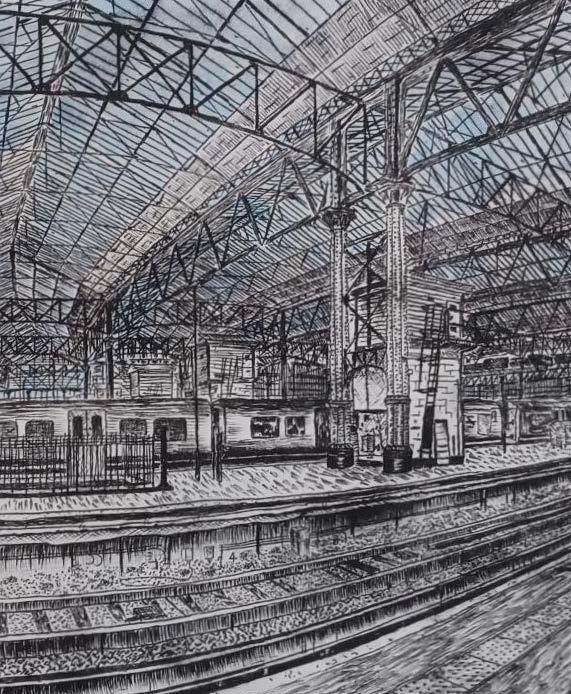
Before the crowds, a regal figure stands The King, with a gold crown laden on his head As he is presented, he can merely wave his hands But hereafter, he will rule the lands until he is dead
With bated breath, the entire world watches on Even the gleaming Sun comes to Westminster Abbey
To see the inauguration of the late Queen’s son As he ascends to attain the title of ‘Your Majesty’
His forefathers stand before him, proud With grandeur and grace, the trumpets sound In his grandfather’s glimmering golden robe, he is shroud And at twelve o’clock on the sixth of May, the King is crowned
“God save the King!” the masses shout He will rule the nation well, we do not even doubt
By Arie BijuArtwork: ‘Memories’ Aberam Sukirtharajah (Fifth Year)
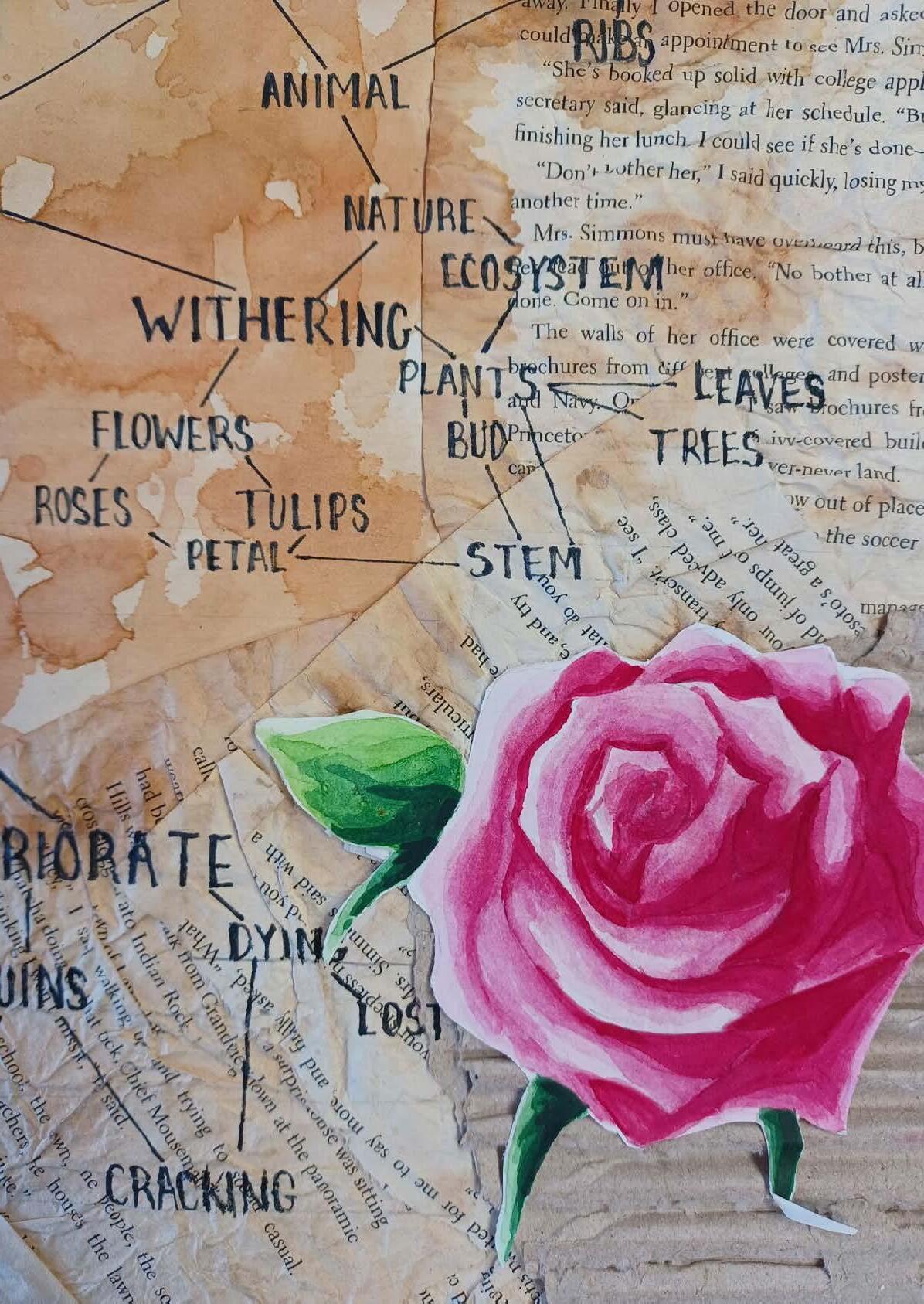
Artwork: ‘Farmhouse’
Oliver Blacklock (Third Year)
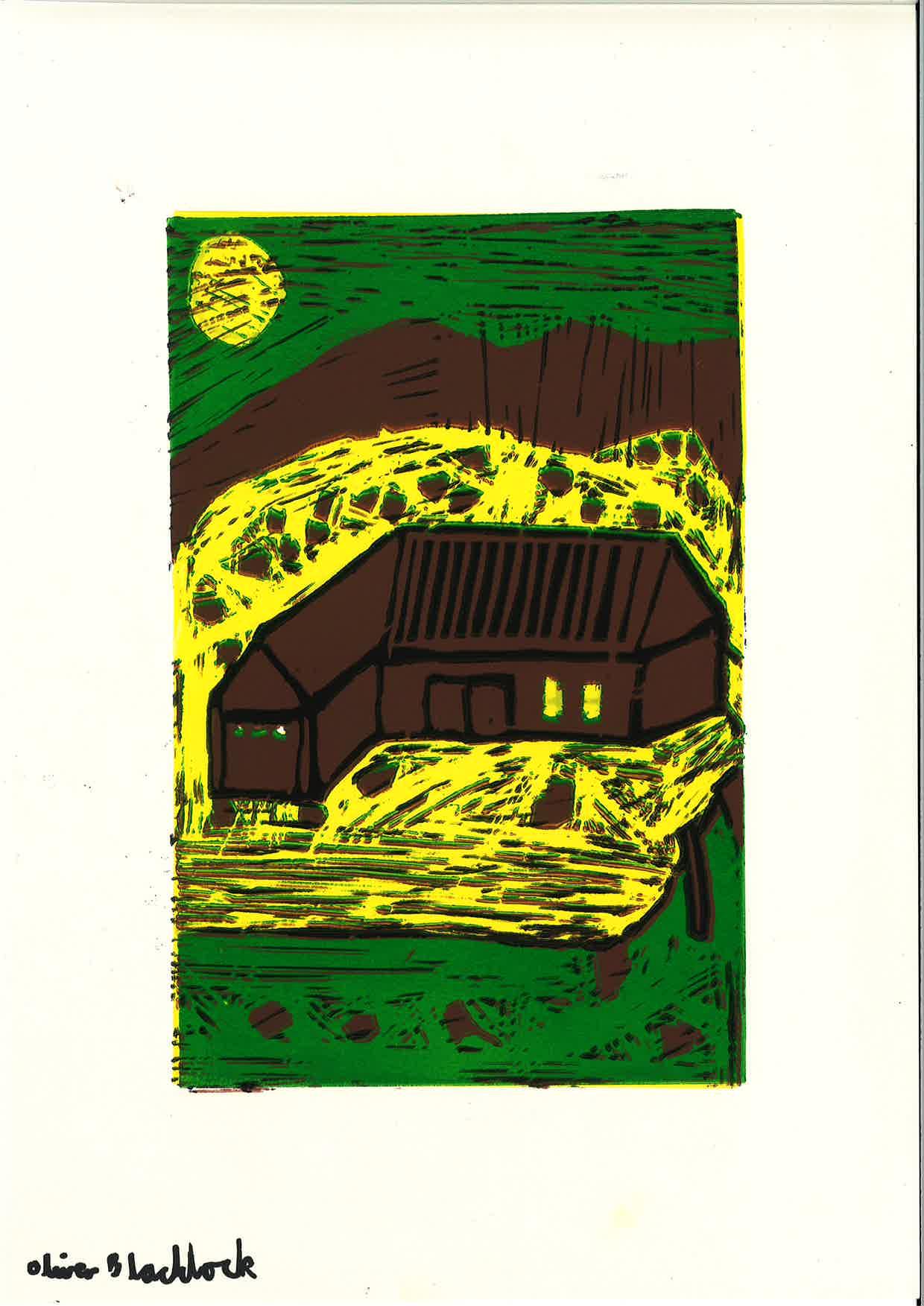
The young, fresh, morning air kissed my face as I stepped out onto the cobbled streets, the brilliant sun illuminating my path along the serene streets. Struck by the beams of gold, the decrepit, elderly cottages were re-vitalised with a sense of high spirits. The expanse of baby-blue skies overhead was vacant with wispy, white hairs of cirrus clouds dancing and pirouetting on the empty ballroom. A flock of geese in formation taking flight occupied all the sound in the area. I continued further, experiencing the early risers who took to the village market. The crisp aromas of new stock dissipated down the road as I wandered out of the commotion.
And it all went away, as if someone had slammed the door shut, and embraced the natural world. With the noise drowned out, I came across a turquoise-blue stream which wound its merry way through the forest. Bobbling and bubbling, it danced around the aged limestone boulders in its destined path. Smooth, soft pebbles whisked about in the bed like glitter. The sun’s chords of light speared down from above, bathing its surface in a gold aura.
I heard a crack in the distance, thinking nothing of it; it was possibly a branch that had been broken under-foot. I gazed at the sky. The life and purity of it had been poisoned with a vile, leaching grey. The stream, once calm and collected, was a raging torrent of pure anger. A storm had been forecast by the wise fishermen of the village, who by now had probably abandoned the once busy market stalls.
Like the flick of a switch, the storm tore through the forest like paper, whipping the tall trees into a frenzied dance. Thunder roared like a stampede of wild elephants, drowning
out the cries of the startled birds. Lightning split the sky like shattered glass, reaching its last fingertips to the earth beneath, illuminating the gnarled, twisted branches and sending shadows darting across the forest floor. Rain pelted down in sheets, turning the dirt into thick, sloppy mud, and turning the streams like the one I came across into raging rivers. The wind howled through the canopy, like lips to a screeching recorder, ripping leaves from their branches, and sending them flying in all directions.
I turned back, picking up speed, my trench-coat flailing behind me like a tail, leaping and dashing over fallen boughs and puddles to escape the wrath of this tempest. My feet pounded the flint, water gushing between the cobbles. I passed the market, crates thrown to the floor in desperation. Shutters and blinds like a band of drummers battered and bruised the glass panes of every cottage. Seeking refuge from the unforgiving fall, I cowered under my porch, my cold and clammy hands fumbling for the house keys. I violently burst in through the front door, and dried myself off by the embers of the fire, peering out of the windows at the ongoing cyclone.
By Thomas Tatnall-Schreve
Green. Grey. Brown. Black. The scenery whizzes past, clinging to the window momentarily before it’s lost again to the incessant, rapid blur. It comes and goes, kilometres flashing by within seconds. Not that anyone’s paying much attention, all enraptured by the little robots in their hands in which their whole lives are conveniently tucked in. Would anyone even notice if the train was going in the completely opposite direction? I highly doubt it. But I guess a person lives a much easier life when the newest flying taxi can come and collect them at the click of a button.
Looking down, the passengers’ bowed heads form a carpet of blondes, brunettes, reds, and rather surprisingly, a few pinks, each bundle of hair shielding the face of its owner from the view of anyone who dares to look up. The only sound that accompanies the gentle hum of the near silent train, is that of various keyboards clacking away, bullets being shot, shattering the serenity of the scene before it returns back to its peaceful state. Glancing over the sea of fine individual straw like strands, some gathered up neatly in petite buns and slick mountainous quiffs, others emanating a more natural, dishevelled look, one person stands out.
Unlike the others, he has his face turned upwards, his gaze stuck steadfastly on the view outside the window, afraid it could be robbed from him forever. His two walnut eyes dart from left to right, latching onto every single detail of the landscape that passes, before locking it up in the safe that holds all his most precious belongings: his memory. The two eyes themselves are like too glistening globes, full of a child like awe, blank maps waiting to be filled with experiences and adventure, sheltered only by the perfect frame of his thick eyebrows. Like bushy caterpillars nestling on his face, his mother used to say, warding off all evil spirits. How he wishes that were true.
His skin, a luxurious shade of burnt caramel, glows in the setting afternoon sun. Like a spotlight, it illuminates each line, wrinkle and mark on his body, an endless trail of tunnels, ridges and valleys for you to journey over. He doesn’t avoid the direct sunlight from radiating on his skin, its comforting embrace a sweet reminder of home. Its
inescapable strength is a little overpowering, yet he bathes in it, lapping it up like a dehydrated animal at a waterhole. It causes the thick layer of dry, dead skin on his body to be unavoidably highlighted under its gaze. This suffocating blanket of eczema is one of the only reminders of his former, more arduous life.
Neatly tucked into his ears, are two small, glistening white headphones. Both ooze out their own gush of sweet honey-like Arabic words, the succulent sounds sticking to his ears. Yet not even this can draw his attention from the window which he sits beside. Despite being the only person in the train to have their own row of seats, he sits squashed in the corner by the window, eyes wide, head cocked, ears pricked. A silent assassin, the train slowly engulfs mile after mile of land, a monster like machine, fathomable only in his widest imaginations. His gaze remains fixed on the scenery that flashes past him, entire livelihoods come and gone within seconds. He closes his eyes, bathing in the peace of the scene.
If only he could have stayed like that all day, letting the endless sea of colours gush past. If only someone had sat next to him as a human shield. If only he didn’t have to stick out like a burning straw house. If only.
“You.” A pudgy finger is thrusted in his face. “You P…. You’re a bloody terrorist.” A swollen beast of a man looms over him spitting the sharp dagger like words, shattering the peace that once shielded him. He emphasises each and every word, his violent enthusiasm causing an eruption of frothy saliva to accumulate at his mouth like burning hot lava being jolted out of a volcano. His arms swing in mad gesticulations, the wrinkled skin flapping like a soggy paper bag. The supposed terrorist cowers by the window, absorbing the hatred with wide eyes and a distorted look of confusion. He scans his eyes over the other train passengers, hoping for any sudden act of saviour, yet no one seems to have heard, their faces plugged in either side by headphones. Or at least that’s the impression that they are trying to give off; he’s pretty sure the young woman wearing the pink bobble hat paused her music and hasn’t yet pressed play.
Artwork: ‘Architecture’ Isaac Quigley (Upper Sixth)

‘“Get off the train. You don’t belong here. Get off.” His fantasy shattered. The alluded safety bubbled in his mind popped. His shoulders have slumped under the strain of his reality. His mind whirs flashing back to the last time he heard those words. The last time when words wounded him in a way he has never quite healed from. The last time that he felt a pain so agonisingly gut wrenching, carving out his insides and pouring his soul onto the ground. The time when a woman was warning him to get off the boat. The time when the bomb was about to go off. The time when his life was spared, and that of his daughters was not. The time when the boat shattered into a hundred little sinking pieces, tugging down all his possessions and his entire world with it.
Get off.
If only they both had.
The man looks up, glancing at the hatred filled eyes that glare down at him. He beings to shake, his lip quivering ever so slightly. Averting his gaze once more to the window, he scans the horizon for any shelter in which his eyes can find refuge in. The disgusting creature, whose shadow blocks the sun to create a dark shadow over the young man’s head begins shouting again. Yet this time he doesn’t stop, the verbal ammunition flowing freely out of the cave that is his mouth, like hot tea gushing out of an endless pot. It goes, word after word, obscenity after obscenity. On and on. On and on. The words continue to hit the attacked, puncturing his skin until he can be bruised no more. He can feel a pool of salty water gathering in his eyes but rapidly blinks them well. Showing weakness now would be like giving a shark the scent of fresh blood. Instead, he tries to block out the words, absorbing the aural punches like a boxing bag. Yet surely even the strongest punching bag can only withstand so much pressure, before it buckles, and crumples to the ground? His heart pounds. Faster. Faster. The strength of a hundred galloping horses pounding in his chest.

He can’t breathe. His mind feels like it’s burning. Melting to a sticky fiery mess. His head feels heavy on his shoulders. The strain pushing him down, choking out his cries for help. He can’t see. A gang of little dots cloud his vision, getting larger and larger. Encroaching closer and closer. His feet tingle. Tiny electric shots of adrenaline hurtle through his body. Something’s rising within him. He feels his body swell. A heavy cloud before a monsoon rain. His throat tingles. It is at this moment he knows there is nothing he can do.
He screams. His accumulated pain, past and present, suddenly unburdened from him. His cheeks burn with his unrestrained fury and his fists long for the impact of soft flesh. Uncontrolled sobs shake from his body. Other passengers are now looking, frustrated at the sudden inconvenient timing of the emotional outburst. Some of their faces distort ever so slightly in the uncomfortable feeling of shame. Most keep their heads down.
It is at this moment the young man knows. No matter how many miles he flees, how many borders he crosses, how many languages he learns, he will never be able to get away from how he is perceived by others. He will never be able to escape who he is. It is at this moment, drowning in a sea of uncommunicable pain that he knows. It is at this moment that he knows he will never be the same again.
He drops his head; his rough black hair joining the rest and closes his eyes…
By Aaran ThakoreArtwork: ‘Footballers’ Fraser Kerr (Third Year)

My Moy and Bastie. She’s my most prized possession. You see, a nurse, Anne I think her name is, a young lass who always wears those noisy high heeled shoes that seem to be all the rage, she got me thinking. She said, ‘Albert, why do you always carry that thing around.’ I don’t have to ask her what thing she meant because I don’t really have many things. Few veterans do.
‘That thing? You mean my Moy and Bastie?’ I had said, but she didn’t reply. She must’ve left. You see, my Moy is the only thing that reminds me of who I am. I never used to appreciate her before, but when Julie passed away, and I’d be sitting by myself on the settee, I began to realise just how much my Moy means to me. She’s the one constant thing in my life that I know for certain won’t be taken from me. I mean, after all, who would want to take something they wouldn’t be able to sell for so much as a penny. Sure, I don’t look at the pictures no more, I mean, how can I? But the feel of the rough wood chafing against my skin, the cool metal shutter resting on my forehead, the slight dent in the corner from when my father dropped her on the way from the shop, those things, they feel like home. My Moy is just as broken and frail as I am. Her rough surface mirrors the roughness of my own hands, the thin fraying pieces of wood which crown its top resemble my wispy hair, the dent on its surface provides the perfect enclave for my nose to nestle in. I love it when my hands are clad in her warm scent, the deep aroma of aged oak wood, the feel of her reassuring weight on my skin. Few times can I sleep without hearing the camera shutter close, breaking off the day just gone and opening the path for the new one. Sometimes, I even get good old Anne to explain the images to me, although half the time they end up being of the floor. Well, as the ever optimist I am, at least I now know the carpet is only damp from all the times I’ve knocked over my cuppa and not from nothing else. But if I’m honest, and normally I’m not, I do miss it. The thrill of the wind flapping my hair, propelling loose locks into flight in all directions. The warm fuzz that carpets my insides like a warm blanket whenever it was just the two of us. My Moy and I against the world I used to say. The freeing feeling of knowing that no matter what happens on the battlefield, my experiences will be held infinitely, etched into the permanent memory that is my Moy. The slight rush of my heart whenever I catch sight of anything that interests me, my body poised ready to capture the slightest action. Photography for me is more than a passion. It’s my life, my blood and the thing I feel most alive doing. In a single shot you can capture what cannot be told in a thousand words. It’s an art, a story and my one true love.
The photos, little black and white personifications of my happiness, timeless portholes to the past. On each little snapshot, you will see the boys happy, smiling, a beer or two in hand. That was the only way in which to survive. And we did survive. Nay, we thrived. At least most of us anyway. Pretending the gunfire that lit up the night skies were nowt more than an evening fireworks show, all of us singing and dancing like madmen till the sun was once more ready to rise. My boys, you see, we were bound together by the war, inseparable like the individual strands of light that make up a photograph. That’s what makes it so special. Once taken, a photo’s existence is rendered permanent. Many of them boys I’ve not seen for years, many didn’t even make it out the war, but in my Moy, well, she holds them all within her, a constant anchor to latch onto, to guide your way through the choppy seas of life.
She is more than just a carrier of my memories, she’s the sole remaining object of my previous life. Photographs lack an expiry date, no photo newer than the one taken before it. The photos will outlive me, well, they practically have already, and there’s something in that fact that I can’t get out of my mind. She’s a companion that’ll never leave my side. The other day I got Anne to record the sound of her in action and I’ve started listening to it replay itself on the recorder, looping over and over until I fall asleep. The sound protects me, jolts me out of a state of complacency and hurls me into the active present, beautifully wrapping up the moment infinitely, like one would protect a wee boy by tucking them into a thick bed duvet.
She’s not like these modern ones that make a high-pitched metallic click that’s over within seconds; it’s a rather more grandiose affair. Like an old woman closing her tired eyes for the final time, savouring the scene before it’s trapped forever, the shutter slowly stutters downwards, a few seconds of pure anticipation, waiting for the final snapping sound, an event forever written in stone. Yet for no two photographs does her shutter snap close at the same time, its unpredictability gifting her playful nature. It’s almost like a game for us, a major event, a gathering of several grown men and women standing still, poised, smiles wide, heads cocked, each daring not breathe, itching to not be the one to ruin the perfectly crafted masterpiece, all secretly hoping someone else will so they’ll still all get the chance to tease. What’s more special than being able to look at a photo and see a whole story. The story of the war, my past, present and future. All my experiences wrapped up in a space no bigger than a briefcase. My Moy, she’s the eyes that I’ll never get back. Without her, I’m just a frail old man, shadowed by an
unknown, brutal past. People would look at me, thinking that I’m just another old veteran and they’d be right. Just one out of many. They wouldn’t know my story. Because my Moy is my story.
You know what, I think I might ask Anne to describe some of the pictures to me. We can go to the garden as it seems like a nice day, what with the warmth I feel on my face and all the birds I hear chirping away. Go out and show her the real beauty of my Moy. ‘Course, Anne will have to find it first, my eyes are having one of their so called ‘episodes’. I think the doctors just say that to make them seem more intelligent, as if as soon as they don their white coats, they are immediately granted an air of greater sophistication. In reality, all it means is that the vague silhouettes of objects that I can normally see are gone. Whenever I complain about my eyes, they love to tell me that I’m one of the lucky ones as I only have temporary vision loss. But I don’t feel lucky. In my view, those with full vision loss aren’t really missing out on much. Them obscure outlines are nowt to celebrate over. But I do wish they’d just skip all the riffraff
and just say it how it is. I’m blind. None of that temporary or partial nonsense. Imagine that, a blind photographer. Anne always says the world is a bizarre kind of place. I can’t really picture her saying the word ‘photographer’ though. I’ll have to ask her to say it for me. I like asking her to say things, her posh Southern accent reminds me of those reality TV shows that I sometimes hear on the telly, and it does truly make me laugh. Honestly, Anne’s the first person I’ve met since the army days that actually pronounces the words ‘me’ and ‘my’ differently. Gosh, I must really find out if her name is Anne. Don’t want to be calling her the wrong name!
By Aaran ThakoreArtwork: ‘Bottles Lino’ Aberam Sukirtharajah (Fifth Year)
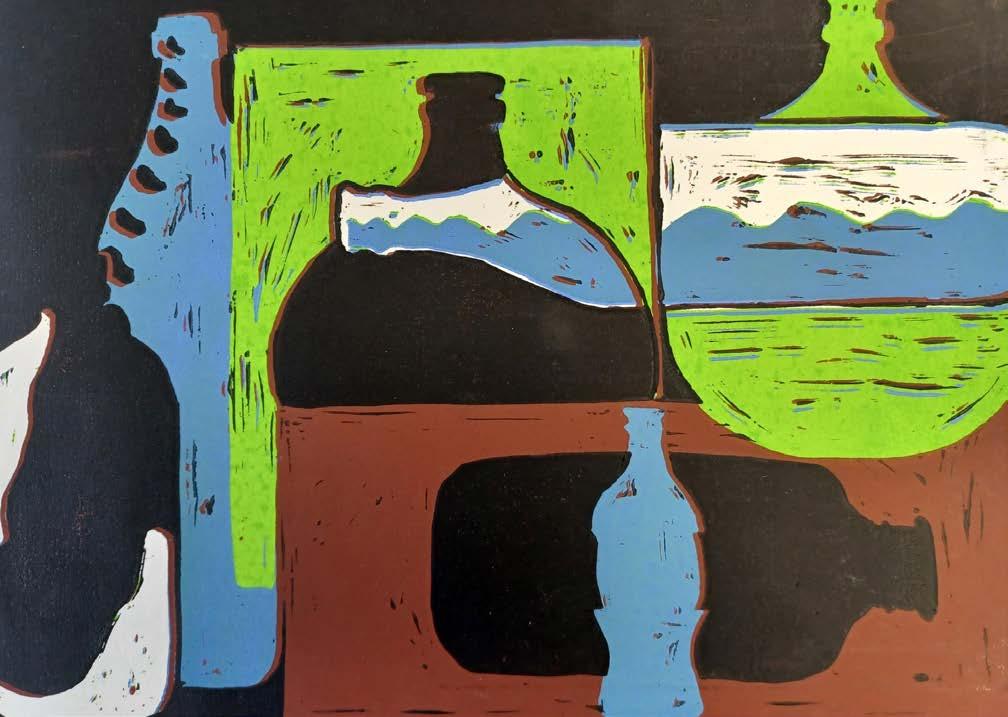
That man was still there. Arthur peeked through the curtains and saw the man sitting in his car, staring at his house. Shoots of hair were growing out on Arthur’s smooth chin, but the man had not budged from his stalking spot. He pulled the curtains quickly and turned his gaze. The ceiling was adorned with crystal earrings as their soft amber light bounced off mahogany and velvet. Arthur sat down behind his work desk, which stretched across the world. He could see a life-sized portrait of a little person he despised, someone who had still not left him. The boy’s mouth curved into a wavy smile, his freckles rippling, and his eyes were dilated as if he had seen a ghost. The name ‘Arthur Blackwood’ was carved on the bottom. Arthur averted his gaze to awards and accolades that glittered his view. He needed its presence, that he was still the Arthur Blackwood everyone admired. A shaky hand took the bottle in hand and popped a pill in Arthur’s mouth. A wave of clean air swept over the man behind the desk, his expression turning into a sage’s. He was ready.
Silent footsteps tread upon the manicured pathways, shrouded by the hushed tranquillity of the opulent neighbourhood. Mansions loomed above, oblivious to the Arthur slipping away. Cloaked in unassuming simplicity, his attire lacked ostentation. No flashy fabrics or extravagant adornments hinted at wealth or privilege. With purposeful determination, he embarked on his covert mission, poised in his cycle to shadow the man outside who was leaving. The beat-up sedan started like a sleeping dog, uncharacteristic of the venue. The sedan started moving, and so did the cycle’s wheels. Arthur surreptitiously trailed the enigmatic stranger through the maze-like streets of the city. Every second heightened his sense of anticipation. The ambient sounds of bustling life formed a symphony of urban rhythms, the distant honking of car horns and the hurried footsteps of pedestrians. The stranger’s movements guided Arthur through winding alleys and dimly lit thoroughfares.
Finally, their clandestine journey brought them to the edge of a forgotten industrial district, where the weight of time had left its mark upon decaying structures. Amidst this desolate landscape stood an abandoned warehouse, its weathered exterior exuding an air of eerie foreboding. Rust consumed the hinges of its entrance, causing the doors to emit a haunting creak that echoed through the desolation. With bated breath, Arthur followed the stranger’s lead, cautiously slipping through the dilapidated entrance. The faint scent of dampness hung heavy in the air, mingling with the scent of old timber. His eyes adjusted to the gloom, revealing faint outlines of three men. In the depths of the warehouse, Arthur hid behind three barrels. Shadows draped around him, cloaking his presence. His heart matched the rhythm of the flickering industrial lights that barely illuminated the table.
‘Were you followed Jack,’ spoke one of them.
‘No, Tommy.’
‘Good. What about our target.’
‘Tonight’s the night. Poor chap’s been holed up for a week. You know him enough to understand what that means.’
‘I know. I have waited so long. I wanted to see that look of terror one last time. Now listen. Jack, get the weapons from the hideout. Tommy, check the vehicles and the truck. That rich brat has security devices and we need to get out of there as soon as possible. Arthur Blackwood dies tonight.’
The three strangers disbanded, each heading to their workstations on the further end of the warehouse. His heart froze as he listened to the chilling words, sending shivers down his spine. The pill wore off. His clothes clung to him with sweat, as if desperate to save him from death’s clutches. ‘The police. I need to call the police,’ he thought. With trembling hands, Arthur dialled the emergency number, his voice a mere whisper as he relayed his desperate plea for help. An emergency dispatch would now get here in 10 minutes.
His fingers were vibrating mercilessly, it’s sound almost detectable in the sulphurous air. His body had only twitched so much once when he was posing for a portrait. His brain was overloaded by stopping himself from running and dooming his life. A voice rang, bringing him out of his stupor.
‘Hey Finn.’
‘Yes, Jack.’
‘Would you mind getting some oil for me.’ ‘Ok.’
The sound of heavy footsteps drew closer to his hiding place. Arthur’s eyes were popping out. He moved swiftly to another place. But alas, fate, cruel in its sense of timing, intervened.
‘INTRUDER!’ Arthur willed his legs to move. Every cell in his body ran. But a predator jumped from the ground and pinned Arthur. He had come face to face with Tommy.
A flicker of panic danced in Arthur’s eyes. His desperate struggle for freedom proving futile against the brute strength that bound him. Helpless and resigned to his grim fate, he was glued to a chair. Arthur watched as the malevolent trio closed in, their eyes gleaming with a macabre satisfaction.
A wave of panic washed over him. He could now see their faces in the dim light.
Arthur said, ‘Tommy, Jack, Finn, it’s you guys?’ ‘Yes you filthy traitor,’ spat Tommy, ‘how I have paid my dues for this moment. Slimy dogs like you who live for money have no place in this world. Jack, knife please.’
The air thickened with impending doom, the metallic tang of fear tangible. Time seemed to slow to a crawl, each second laden with the weight of impending demise. Tommy raised his hand to Arthur’s neck. ‘Any last words, boss?’
He had to buy time. He was too young. He had no one to remember him. The weight of his past transgressions pressed upon him. He opened his heavy weighing lips to say, ‘Please don’t tell anyone the truth about me.’
‘Spoken like the weasel you are,’ and Tommy raised his hand. Arthur closed his eyes, knowing the next things he would see would be Lucifer’s abode.
Seconds passed. Nothing. He opened his eyes to chaos. Men in blue uniforms were now pinning down the three assailants. A symphony of sirens pierced the silence, heralding the arrival of the police. A surge of hope coursed through Arthur’s veins, a flickering flame of life had been reignited within him. The cacophony ensued, as law enforcement agents flooded the warehouse, their presence an embodiment of salvation.
The bonds that held him captive fell away, relinquishing him from the clutches of imminent death. Eyes wide with disbelief, Arthur witnessed the triumphant conclusion to his harrowing ordeal.
Rescued from the brink of annihilation, Arthur emerged from the warehouse, the cool night air a soothing balm against his sweat-soaked brow. With grateful eyes, he met the reassuring gazes of the officers.
As the arrests unfolded, Tommy sneered at Arthur, venom in his voice. “Congrats Arthur, You betrayed us again.”
Arthur’s gaze remained fixed ahead, his features masking his true emotions. The police locked them up with a few questionable glances at Arthur.
Returning home, his mansion seemed emptier than ever, the silence deafening. The truth gnawed at him. Behind closed doors, Arthur’s gaze lingered upon a hidden wall adorned with photographs of his past associates. Jack, Tommy and Finn and him smiling as if completed a heist. Memories of a life he had once led, a life that could never truly be erased. The truth had set him free, but at what cost?
Arthur grappled with the weight of his decisions. The world saw him as a successful businessman, an embodiment of accomplishment, but within him lurked a secret, a truth that could shatter the very foundations of his existence.
The story of Arthur’s life remained suspended in uncertainty. A life of wealth and success built upon a foundation of darkness. The closing chapter had yet to be written.
By Vedansh Balasaria